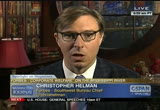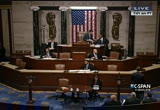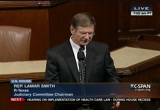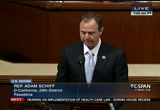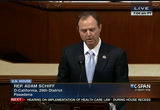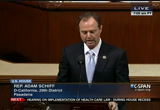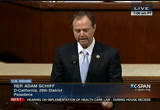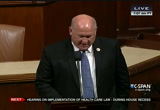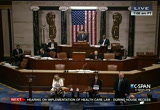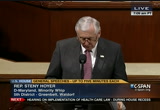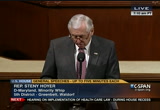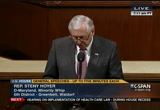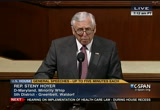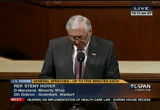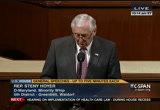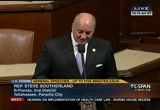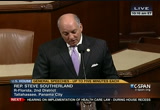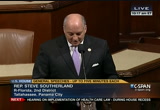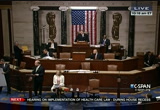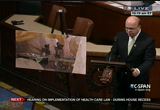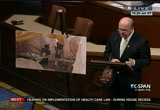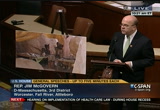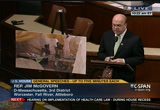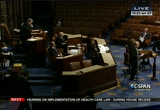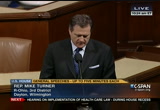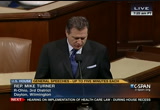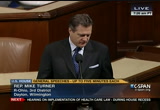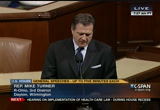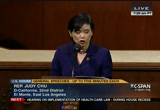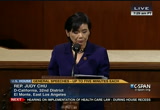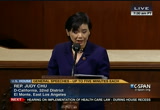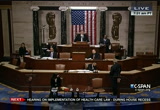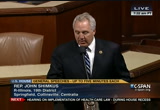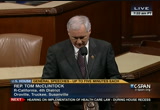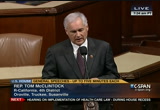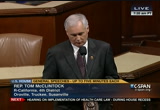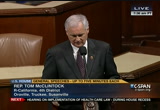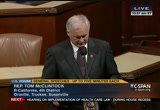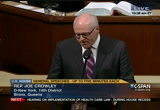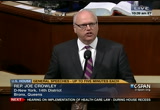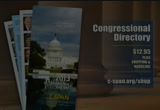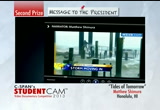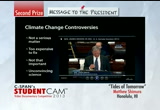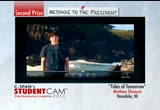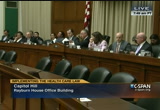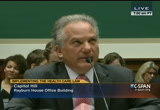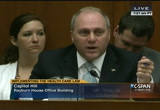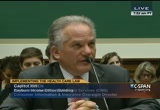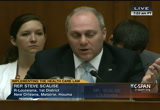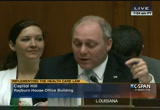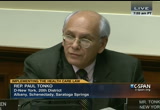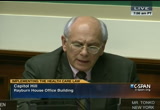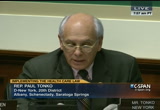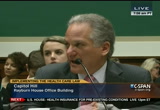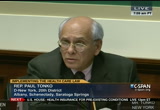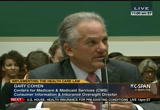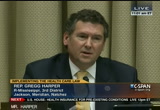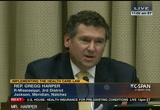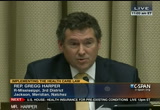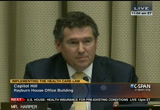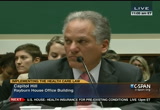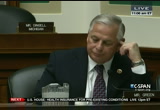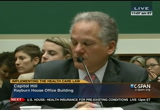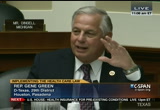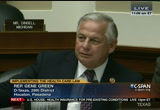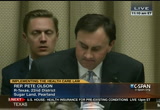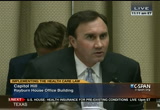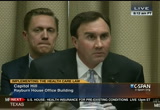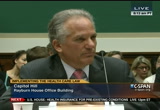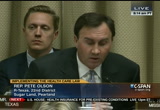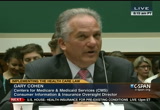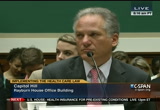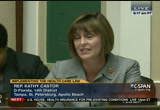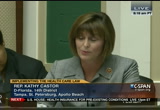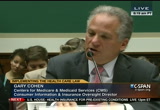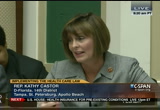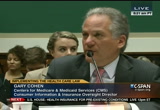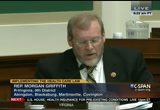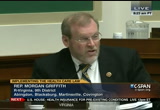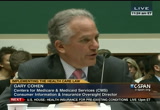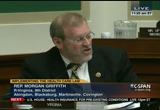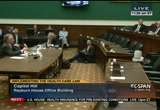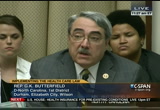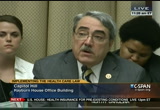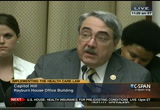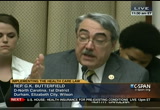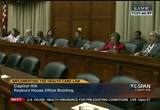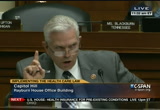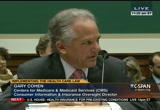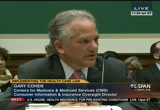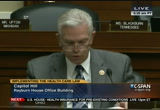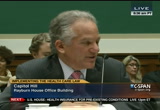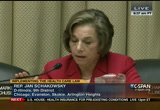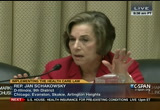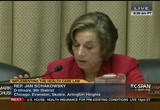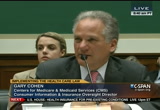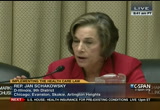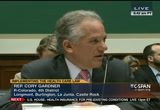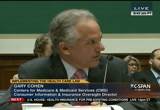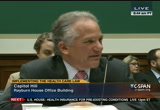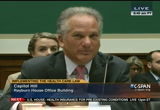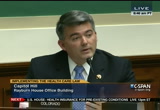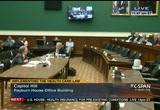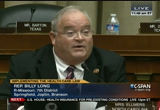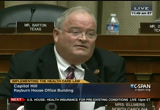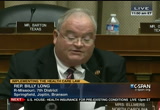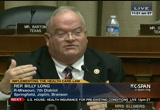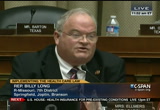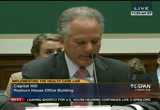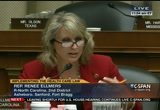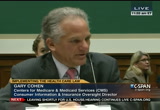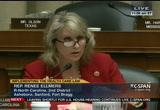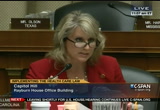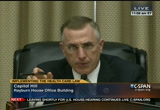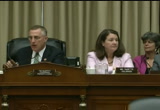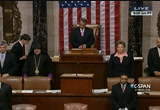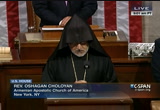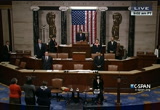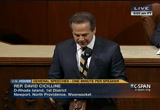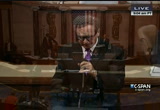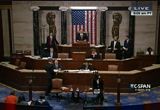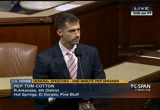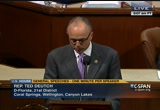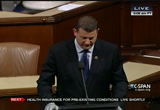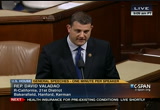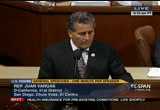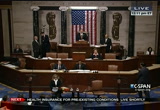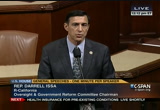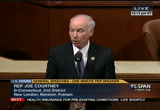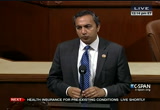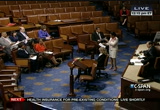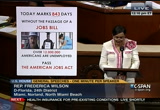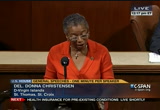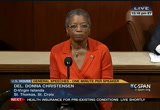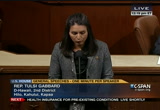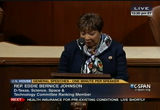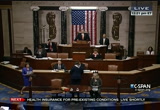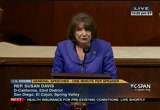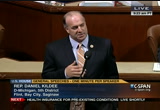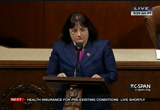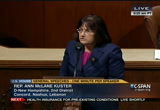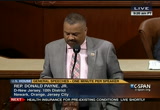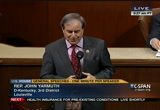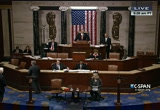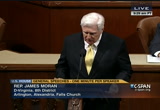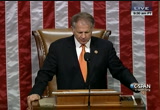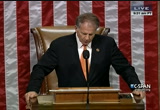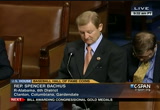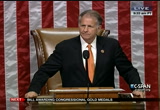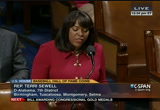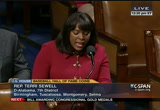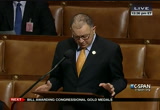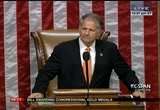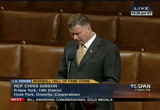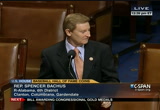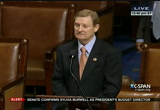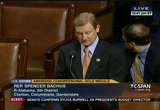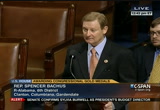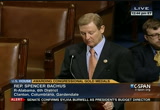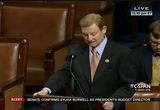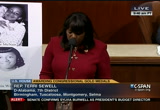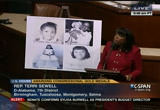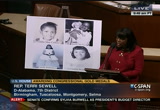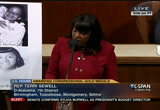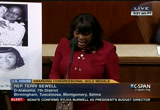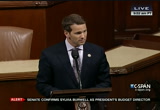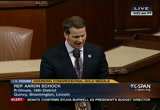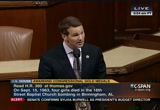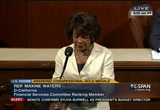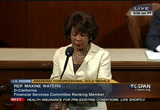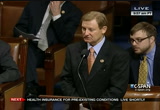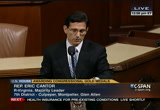tv Public Affairs CSPAN April 24, 2013 10:00am-1:00pm EDT
10:00 am
additional $40 million a year, that is nowhere close to this $30 billion in taxpayer subsidies he is hoping to get. host: the house is about to come into session but this legislation that you talked about, an additional $8 billion for water infrastructure, where is it headed? i do not think anywhere quickly. we are in the sequestered age right now. every dollar counts. the sponsors of these bills would be hard pressed to convince their colleagues that handouts toive more a system that already receives so much in federal subsidies. i do not think there are going to go anywhere. host: christopher helman, thinking so much. [captioning performed by national captioning institute] [captions copyright national cable satellite corp. 2013] 2013. i hereby appoint the honorable rodney l. davis to act as
10:01 am
speaker pro tempore on this day. signed, john a. boehner, speaker of the house of representatives. the speaker pro tempore: pursuant to the order of the house of january 3, 2013, the chair will now recognize members from lists submitted by the majority and minority leaders for morning hour ebate. the chair will alternate recognition between the parties with each party limited to one hour and each member other than the majority and minority leaders and the minority whip each, to five minutes but in no event shall debate continue beyond 11:50 a.m. the chair recognizes the gentleman from texas, mr. smith, for five minutes. mr. speaker, the senate immigration bill never secures the border. it plans to mostly secure the
10:02 am
high-risk sectors which are less than half the border, and there is no guarantee this will happen since there are no deadlines. in fact, if the high-risk sectors are mott secured after five years, a commission is established to make recommendations. make recommendations sure doesn't sound like a secure border to me. and there is the entry-exit system to deter those who overstay their visas. about 40% of all illegal immigrants. but it only applies to airports nd sea portports, not land checkpoints where most -- seaports, not land checkpoints are most secure. so it's border security later, if ever. i yield back. the speaker pro tempore: the gentleman yields back. the chair recognizes the gentleman from california, mr. schiff, for five minutes.
10:07 am
the speaker pro tempore: the gentleman yields back. the chair recognizes the gentleman from pennsylvania, mr. thompson, for five minutes. mr. thompson: thank you, mr. speaker. mr. speaker, this coming weekend, i have the opportunity and the honor to attend the penn state university's 11th annual equine quarter horse sale. horses of various breeds have always been a part of penn state's department of dairy and animal science. penn state started the move towards the lighter horse types. today, p.s.u. focuses on the quarter horse for its diversibility, from working stock to show and recreation.
10:08 am
quarter horses are estimated to generate more than $10.5 billion in economic output nationally. now, this saturday, 21 quarter horses will go on the auction block at penn state's popular equine science showcase and quarter horse sale. the auction has grown with support from students and people in the equine industry from seven the first auction to almost 500 last year. mr. speaker, i want to congratulate the 2013 sale participates penn state students, the student co-managers, jorde hudson and melissa wise, and instructor of horse farm coordinator, brian eagen, and i yield back. the speaker pro tempore: the gentleman yields back. the chair recognizes the gentleman from maryland, for five minutes. >> i ask unanimous consent to revise and extend my remarks. the speaker pro tempore: without objection.
10:09 am
mr. hoyer: mr. speaker, seven weeks on, america has begun to feel the effects of the republican policy of sequestration. sequestration defies common sense and is irresponsible. it is happening because the tea part faction of the republican party frankly has been on cutting spending no matter what the consequences, no matter how irrationally it is done and no matter how adverse the consequences of these cuts. these arbitrary across-the-board cuts to federal programs without regard to our priorities was never, never meant to be a slougs, but rather a deterrent to -- solution, but rather a deterrent to congress failing to reach one. since coming into effect on march 1, americans are seeing why sequestration is not a policy we should follow or continue. this week the f.a.a. began
10:10 am
furloughs for 47,000 employees. i've talked to the secretary. i've talked to the deputy secretary. they do not have an option under the policies that this congress has adopted. 13,000 air traffic controllers are among those 47,000. already delays of up to two hours at major airports are disrupting travel which impacts business and produces major headaches for american families trying to get to where they need to go. some flights have been diverted because of air traffic control system is being overwhelmed with limited personnel. in addition to its effects on the f.a.a., sequestration is also placing a heavy burden on small business. according to an article in "politico" on april 16, a few days ago, small businesses are being hit the hardest by sequestration cuts. the s.b.a. bahe is being forced to cut -- the small business
10:11 am
administration is being forced to cut $7.7 million in loan subsidies. that means $167 million in loans not available to small businesses. at the same time, the article es on to report as many as 956,000 small business jobs could be at risk from sequestration as employers lay off their workers in anticipation of further cuts. we ought to abandon this stupid policy. also at stake are critical research programs in medicine and science research that fuel american innovation and advance life-saving treatments. they're at risk because of sequestration. cuts to the national institutes of health are already leading to a reduction in research grants, including tens of millions of dollars that will halt innovative genomics and cancer research at some of america's top universities, including harvard, penn and john's hopkins in my state.
10:12 am
and they will award 1,000 fewer grants to researchers for helping keep america on top of technology and innovation. how irrational. is is a stupid, harmful, future-hurting and america undercutting policy. it must be changed. sequestration is also reducing our military readiness and putting civilian defense employees at risk of being furloughed. and more to the point, putting at risk our own national security. communities in my district, across maryland and throughout the country, whose economies depend on a strong military, are going to be hard hit. but the good news is there is an alternative. congress, congress has the power to end sequestration by reaching a big and balanced
10:13 am
solution to deficits that can replace these irrational cuts, but to do so, democrats and republicans will have to work together in a bipartisan way. we ought to go to a conference n the budget, adopt a fiscally responsible balanced plan and eliminate the sequester for this year and the eight years to come. we offered an alternative to sequester four times in the last month, and four times we were not given the opportunity to have it voted upon on this floor. this was supposed to be an open, transparent and we could consider alternatives. we did not. but i believe we can do it. our economy, our ability to create jobs and the success of our country in the decade ahead s dependent on our jettising these irrational cuts we call sequestration. too many jobs, lives and livelihoods are at stake for
10:14 am
congress to engage in partisan games. as the weeks and months continue without turning sequestration off, its effects will only get worse. let's act now. let's act together. let's act in a bipartisan way before our people and our businesses feel the full effects of this irrational and senseless sequestration policy. let's work together to achieve the big, balanced solution the american people deserve from their congress and that we owe to our country. mr. speaker, i would ask unanimous consent to include the end of my remarks, an article written by our colleague, representative david price of north carolina, entitled "lawmakers: sequestration double talk." i ask unanimous consent to include that at the end of my remarks. the speaker pro tempore: without objection. mr. hoyer: yield back the balance of my time. the speaker pro tempore: the gentleman yields back. the chair recognizes the
10:15 am
gentleman from florida, mr. southerland, for five minutes. mr. southerland: thank you, mr. speaker. i rise today to honor the place that i am proud to call home. bay county, florida. 100 years ago today, bay county was established by act of the florida legislature, igniting a century of growth and opportunity for a close-nit community that still cherishes its rich history and traditions. bay county is located in the heart of northwest florida overlooking 41 miles of sugar white sand beaches along the gulf coast emerald green waters. with an additional 270 square miles occupied by pristine lakes, springs, streams, and the magnificent st. andrews bay, bay
10:16 am
county has become a national destination for tourists and their families, fishermen, boaters, and water sports enthusiasts. while bay county's beaches and diverse inland areas attract over eight million visitors each year, it is its people who live and work there that give this place a unique spirit. a small community of little more than 11,000 people in 1920, bay county now embodies the drive of a diverse and growing population, totaling more than 170,000 people. bay county's work force is among the best educated and most highly prepared in northwest florida. with institutions of higher learning that rival any in the region. its economic engine is fueled not by tourism alone, but also by thriving small business,
10:17 am
nationally recognized companies, major manufacturers, and one of the newer airports in the united states. and as the home of kindle air force base, naval support activity panama city, and more than 22,000 veterans, bay county enjoys a rich military history. on this day, april 24, 2013, the day of bay county's centennial, i'm proud to join my friends, neighbors, my family and local an county officials from panama city, panama city beach, lynn haven, springfield, parker, calloway, mexico beach, and the unincorporated areas of our county to celebrate our past and our bright future as we work hard to make bay county a better place to live, work, and play.
10:18 am
mr. speaker, i ask for unanimous consent to enter this statement into the congressional record. the speaker pro tempore: without objection. mr. susterland -- mr. southerland: thank you, i yield back. the speaker pro tempore: the chair will receive a message. the messenger: mr. speaker, a message from the president of the united states. the secretary: mr. speaker. the speaker pro tempore: madam secretary. the secretary: i have been directed by the president of the united states to deliver to the house of representatives a message in writing. the speaker pro tempore: the chair recognizes the gentleman from massachusetts, mr. mcgovern, for five minutes. mr. mcgovern: i ask unanimous consent to address the house, revise and extend. the speaker pro tempore: without objection. mr. speaker, 10 years ago crimes by the government of sudan against its own people in darfur were just beginning.
10:19 am
the world witnessed the burning of villages, poisoning of water, murder, rape, brutal asalt, and displacement of entire villages by violence. in 2004 they were characterized by the u.s. government and congress as genocide. for the past six years the international criminal court has indicted and issued arrest warrants for sudan's high official, military commanders for multiple counts of war crimes and crimes against humanity. in 2009 and 2010, president bashir himself was indicted by the i.c.c. for war crimes, crimes against humanity, and genocide. international movements in support of the people of darfur arose around the world, including a broad coalition here in the united states of religious, labor, peace, human rights, and student organizations calling for an end to the genocide in darfur. between 2004 and 2007, congress passed a series of bills limiting usaid to sudan and
10:20 am
applying sanctions against sudan for its atrocities in darfur. in 2007, i visited refugee camps in eastern chad filled with hundreds of thousands of men, women, and children who have fled the violence of darfur. each has a story of horror and violence. wase i was there the border crossed and villages were attacked inside chad displacing thousands of people in the desolate landscape and brutal heat in the dry season. i witnessed with admiration the emergency response mobilized within hours by the u.n. and international humanitarian agencies and n.g.o.'s to provide these newly homeless and traumatized people with water, food, shelter, immunizations, and medical care. i will never forget those people, those children, and will i never forget the caring and highly professional humanitarian aid workers who provided lifesaving support to these refugees under difficult and dangerous conditions. khartoum continues its brutal
10:21 am
campaign in darfur and there is no end in sight. eric rodriguez, who 10 years ago bravely brought to the world some of the very first photo and video images of the scorched earth campaign taking place in darfur continues to document ongoing atrocities in the region. the primary targets continue to be civilians from african tribal groups, surviving tenuously in the chaotic region. eric is now on the faculty of smith college in north hampton, massachusetts, and i'm proud to be his representative in congress. today the violence and abuses in darfur have expanded across sudan. this february the u.n. reported that over 1.5 million people have been displaced or severely affected because of the violence in darfur, and blue mile, and others, including some 90,000 to 100,000 people newly displaced in darfur. for over three years the sudanese government has carried out an aerial bombing against civilians under the pretext of
10:22 am
battling armed incourage senies that operate in the area. the government continues to deny the world food program and other humanitarian and religious organizations access to blue mile -- blue nile to help thousands. the high commissioner for human rights stated abuses by the government of sudan in these states may constitute war crimes and crimes against humanity. mr. speaker, there comes a time where we have to say enough is enough. that is why congressman frank wolf, mike capuano, and i are reintroducing today the sudan peace securing accountability act. khartoum's abuse of its own people is nationwide and this bill focuses on sudan as a whole. it requires a u.s. comprehensive strategic to end serious -- strategy to end serious human right violations in all of sudan. the bill supports the aspirations of the sudanese people for peace an democratic
10:23 am
reform. it encourages other governments and individuals to end support and aid to the government of sudan. and it reinvigorates genuinely comprehensive and sustainable peace efforts to end sudan's multiple crises. we must send a clear message to khartoum that the time for change is now. that these abuses must stop. and that peace and genuine participation in the future of sudan are rights that belong to all the people of sudan no matter their race, ethnic background, religious, or political affiliation. i ask all my colleagues to join with us on this legislation. it is past time to put an end to the pain, suffering, and genocide taking place in sudan. it is time to support peace, security, and accountability. mr. speaker, i ask unanimous consent to submit additional materials to the record. the speaker pro tempore: without objection. mr. mcgovern: i yield back my time. the speaker pro tempore: the gentleman yields back. the chair recognizes the -- the gentleman from ohio, mr. turner, for five minutes.
10:24 am
mr. turner: i ask unanimous consent to revise and extend. the speaker pro tempore: without objection. mr. turner: mr. speaker, once again president obama and his administration has offered up america's missile defense shield as a bargaining chip. just the other week secretary of state john kerry flew to china and offered to remove our recently added defenses in the pacific to encourage them to counter the increasingly belidge rent tone and actions by north korea. this is the same failed strategy that the administration offered up to the russians in exchange for them engaging with iran. if it failed to work then, how could it possibly work now? at a time when our missile defense system is the only defense that we have to the threat from north korea and the emerging threats from iran, i am greatly concerned that our nation's missile defense strategy is languishing. the end result is increased risk to the united states, increased cost to the taxpayer, and
10:25 am
needless alienation of our allies. our enemies around the world have sought nuclear weapons and missile technology. yet the obama administration has consistently reduced missile defense funding. they have abandoned previous bush administration bush administration strategies -- bush administration strategies that sought to respond to these emerging threats and has compromised the implementation of current missile defense programs. meanwhile they have sought elusive russian and now chinese approval of the right of the united states to defend itself. most recently the administration has abandoned its own missile defense strategy known as the phase adapive approach in favor of a stop-gap measure of finally placing the additional ground-base missiles in alaska they had previously canceled. i welcome the administration finally completing the missile field which it has attempted to close. although this reveals that they have no plan to reasonably respond to the real and
10:26 am
foreseeable threats from north korea and iran. this announcement leaves the united states without an articulated missile defense strategy. this deficiency is compounded by the effects of the administration's clumsy handling of our relationship with our nato allies. the abrupt cancellation of the bush administration missile defense commitments, coupled with the announcement of the abandonment of the president phase adaptive approach, have left our allies to stand alone in the face of domestic criticism and russian opposition. our relationship with the polish government has yet to fully recover and i am concerned that this administration may repeat the same relationship straining other allies.ur he must address the damage done to our relationships with our nato allies as a result of their failed missile defense strategies. i am concerned that the administration failed to recognize the significance of the emerging threats from north korea and iran. which places the united states at risk.
10:27 am
the administration should inform congress of the effects of the abandoned and failed obama administration phase adaptive approach and over their plan to complete the bush administration 's alaska missile defense strategy. further, since completion of the alaska field alone is insufficient for the full protection of the united states, i am calling upon the administration to sport the site, selection, and completion of the united states east coast missile field to complement the alaska site. the world is not becoming a safer place. offering to weaken our defenses in hopes of a rational--irrational nations suspending their weapons programs is not an effective strategy to protect the united states. simply put, these offers are of greater benefits to our adversaries than to the protection of the american people. they are to the detriment of the american people. ith that i yield back. the speaker pro tempore: the chair recognizes the gentlewoman
10:28 am
from california, ms. chu, for five minutes. ms. chu: this month the san pedro valley lost a wonderful leader, the native american community lost a true champion, nd i lost a dear friend. helen dorky throughout her years of public service, one thing remained constant, she fought to make life better for those around her. all people were her family. all children were her children. helen's actions were always guided by the needs of younger generations. and educator at heart she spent four decades if public school classrooms. she taught where she was needed most, where the value of a lesson learned would have the greatest impact. places like the bridges community day school where she worked with young people who had worn out their welcome in the traditional school system through expulsion, drug use, or family problems. none of that mattered to helen.
10:29 am
what mattered was helping kids build a brighter future for themselves. one new lesson at a time. but being an educator meant more to helen than teaching in schools. it meant being a good colleague as well. she was a devoted member of the california teachers association, and one -- won the california teacher award. helen's compassion for others led her to speak out and fight for those in need. much of her activism was rooted in who she was as a member of the cherokee nation. she had personal insight into the needs of native american communities as she fought tirelessly to have them addressed. by the time she was in college at ucla, she had personally felt pains of intolerance directed at her and her heritage. determined to change the wrongs she faced, helen boarded a bus and rode clear across the
10:30 am
country to hear martin luther king deliver his, "i have a dream" speech. that dream was her dream. her message was his message. and she fulfilled it each and every day for the rest of her life. helen worked side by sidele with the tribe to help them gain recognition and joined the molango nation in promoting human rights. she took those challenges and struggles that are unique to reservation life and raised awareness for solutions. her efforts helped ensure those facing difficult conditions on reservation land have the education to build a brighter future. . she helped them improve their quality of life and she worked hard to ensure that textbooks in california accurately reflected their true history of native people. as her advocacy led to public service, helen was a founder
10:31 am
and chair of the native american caucus for the california democratic party. one of the first native american caucuses for a state party. helen left us not long ago but her impact lives on. the lives she touched are forever changed for the better as are the communities she fought to empower. her life's work provides an inspiration for all of us. so today i bid farewell to a friend, a mentor and a true role model to so many and i say thank you for all that you've . ne for us, helen doherty the speaker pro tempore: the chair recognizes the gentleman from illinois, mr. shimkus, for five minutes. mr. shimkus: i ask unanimous consent to revise and extend. the speaker pro tempore: without objection. mr. shimkus: thank you, mr. speaker. mr. speaker, i rise today to commend the recent actions taken by the president of the
10:32 am
ukraine. on april 7, the president pardoned former interior minister, the former environmental protection minister and four others. these pardons demonstrate ukraine's desire to reform their justice system as the expanding eastern european nation continues its transition towards democracy. his action is in the right for the president and the administration and there is much to be done for ukraine's system to be considered in line with western standards. this would include an end to all political persecutions and call to iterate my release the former prime minister. i've long been a supporter of our nation's ability to assist new emerging democracies as they develop the pillars for building successful and lasting governments. i'm encouraged by these recent steps and hope that ukraine continues on its path towards
10:33 am
full european integration. the united states government welcomes the president's others to pardon the and hopes it ends the political prosecution and other opposition figures. with that, mr. speaker, i yield back the balance of my time. the speaker pro tempore: without objection, the chair recognizes the gentleman from california, mr. mcclintock, for ive minutes. mr. mcclintock: thank you, mr. speaker. i rise in strong opposition to the national park service to remove long-standing tourist facilities from yosemite national park, including bicycling and raft rentals, horse back riding, snack shops, the ice skating rink at curry village, tennis courts and swimming pools, the arts center and the historic stone sugar pine ridge. these facilities date back
10:34 am
generations and provide visitors with a wide range of amenities to enhance their state at and their enjoyment of this world renowned national park. to add insult to insanity, this comes at a quarter billion dollar price tag to american taxpayers. mr. speaker, yosemite belongs to the american people, and the park service's job is to welcome them and accommodate them when they visit their park, not restrict and harass them. indeed, yosemite was set aside by legislation set aside by abraham lincoln for, quote, the public use, resort and recreation for all time, end quote. this proposal fundamentally changes the entire purpose for which yosemite was set aside in the first place. tourists don't go where they're not welcomed. yosemite competes with thousands of vacation
10:35 am
destinations, and the more inconvenient and unpleasant park managers make it for yosemite visitors, the fewer visitors they're going to have. now, that might be convenient to them, but it will devastate the economy of all of the surrounding economies whose economies depend upon tourism. now, the park service is attempting to justify this as a court ordered response to the wild and scenic rivers act. this is disingenuous. the settlement agreement they refer to simply requires that a plan be adopted consistent with current law. it does not mandate such radical changes in longstanding visitors services and amenities. indeed, the democrat who authored the act that designated the merced under provisions of the wild and scenic rivers act has just released a strong letter condemning the proposal saying in no uncertain terms, and i quote, the wild and scenic rivers act was never intended to apply to the merced river
10:36 am
within yosemite national park at all. the merced river within yosemite national park is protected and regulated by the national park service and has never needed an overlay of inconsistent and confusing legislation. the merced river in yosemite valley has been almost recreational for almost 150 years. it has never been wilderness. any plan which proceeds should not change any infrastructure or ban any activities traditionally carried on in yosemite valley, end of quote. indeed, when he authored the legislation designating the merced as wild and scenic, these tourist facilities already existed and nowhere in the bill's findings is there any mention of an intention to force their closure or to override park policies. in fact, many of the facilities slated for removal are not even on the merced river and do not in any way impede or affect its flow. the officials of the national park service are clearly not
10:37 am
required to take these actions. it's becoming increasingly apparent that they want to take them and they intend to take them despite widespread public opposition from all but the most radical elements of the environmental left. indeed, when 13 mersmebs of the california delegation, including liberal democrats and conservative republicans alike asked for an extension of the public comment period, the park service grudgenly extened it by only 12 days, 12 days. it's obvious that park officials have already made up their minds and are merely walking through the formalitys. i believe that this matter and related issues of public access cry out for an investigation. in the meantime, if members of the public want to protest the elimination of many of yosemite valley's tourist amenities and iconic landmarks, time is running out. my website at
10:38 am
mcclintock.house.gov will tell you how you can protest this action and i strongly urge them to do so. with that i yield back. the speaker pro tempore: without objection, the chair recognizes the gentleman from new york, mr. crowley, for five minutes. mr. crowley: i thank the speaker for yielding me this time. mr. speaker, the 113th congress has been in session for over 100 days, and so far the majority has attacked workers' protections, slashed important job training programs and has created one manufactured fiscal cliff after another. this is the last week before yet another recess, but there's still no proposal to help americans get back to work. instead, we have another attack on the affordable care act. plus, we have on the floor day the responsible helium
10:39 am
administration and stewardship act. i in fact have a balloon, mr. speaker, that i would have liked to have on my wrist as i gave this speech this morning, but i was told it would not be appropriate and maybe not. helium, helium, really? i hate to burst the majority's bubble, but democrats and republicans actually agree on it had bill. there was no need to take up a full day of our time to debate the bill. we could have considered it under the expedited procedures and save time for proposals that create jobs instead of balloons. with leadership like this, it's no wonder the american people are feeling discouraged and deflated. helium. helium. i yield back.
10:40 am
10:41 am
the climate changing effect of rising sea levels. >> mr. president, 2012 has been a difficult year for us. >> look around what's happening now. increased heat waves, more droughts, more sudden downpours, more widespread wildfires and worsening storms. the extreme weather events are convincing many americans climate change is a reality. >> we have the storm of the century every year now. >> polarized caps and glaciers mets, more water enters the system. >> sea levels rose even three feet, cities like miami, new orleans, oakland, california, and others could find themselves under water. >> in october, 2012, hurricane sandy showed us the destructive power of an angry ocean. much of the damage was caused by flooding and storm surge. the sea level rises, such storms will become even more destructive. mr. president, unless we address
10:42 am
the problem of sea level rise now, we might find ourselves swept away by the tides of omorrow. >> here in hawaii the ocean is a central part of our culture and our way of life. rising sea levels will effect how we live, work, and play. this 300 acre park in my neighborhood could be under water if sea levels rise as predicted this century. hawaii is vulnerable for soil erosion, flooding of low-lying areas, and saltwater contamination of fresh water supply. but i realize that rising sea levels are not just a problem for hawaii. so also last summer i traveled to the u.s. mainland to see how this is a problem for our whole country. my first stop was san francisco, where i saw how the ocean was eating away at the foundations of the great highway along the coast. next, we traveled to the
10:43 am
california delta, covering over 1,000 square miles. the california delta is an expansive estuary where the sacramento and san joaquin rivers meet. the california delta includes some of the state's most productive farmland and provide water for 2/3 of the state's residents. over the years the land has subsided so it is now below sea level. the land is protected by an elaborate system of levees vulnerable to overtopping and failure and require constant maintenance. the california delta in the central valley regions are among the most vulnerable to sea level rise. next stop was boston, an oceanfront city with homes, businesses, and infrastructure that face dangers from rising sea levels. much of the city built is at or only a few feet above sea level right now. as sea levels rise during this century, boston's neighborhoods,
10:44 am
highways, and waterfront areas will be dreaded. on to new york city i was surprised to learn how close the city is to the ocean. major business centers and residential areas are at sea level. infrastructure like subways and tunnels are actually below sea level. several months after our trip, hurricane sandy showed the world how vulnerable this region is. in your neighborhood, too, mr. president, rising sea levels will have an impact. low-lying areas along the potomac waterfront are already flood prone. with sea level rise, more areas are at risk, including highways, subways, and national monuments. my final stop was the university of hawaii where i consulted with professor fletcher, an expert on sea level rise. >> sea level rise is a term that describes the rise of sea level as a result of global warming. the major greenhouse gases causing global warming are
10:45 am
carbon dioxide, methane, o zone, the clora flora carbons and nitrous oxide. by far the most dangerous is carbon dioxide. once it is in the atmosphere, some may be taken back out of the atmosphere through by logic and geologic processes and ocean acidfication absorb it. approximately half we contribute to the atmosphere will likely stay there for 1,000 years or more. because of the accumulation of heat in the atmosphere, melting glaciers and ice sheets around the world are melting. the ocean is warming, which produces roughly half of the amount of sea level rise that we expect to see in the very near future. the other approximately half of sea level rise comes from warm air melting ice. the estimates for globe sea level rise it will reach approximately a foot above president by mid century, three feet to four feet by the end of
10:46 am
this crentry. global warming is occurring fastest and with greatest magnitude in the arctic region. now, if there is some sort of catastrophic collapse of the wes end arctic ice sheet or portions of greenland, the possibility for truly damaging and dangerous sea level rise exists. there's certain points of no return or tipping points that scientists conjecture exists out there. the greeland ice sheet being one. another being the loss of the arctic sea ice. we may cross the tipping point there and may have already crossed it and potentially looking at extremely dangerous levels of sea level rise. the possibility of these dramatically high sea levels exist. if that is the case, if sea levels do rise to these levels, unfortunately it will be game over for many of our major urban centers, not to mention the natural ecosystems along our coastal zone between urban centers. >> after professor fletcher's clear explanation, i was surprised to learn how controversial this issue is.
10:47 am
>> president obama promised to begin to slow the rise of the oceans. and to heal the planet. >> the administration claims that we must cut our emissions of carbon dioxide despite the cost so that we stave off, quote, global climate disruption >> and if it is created by some sort of human activity, is it something we should be concerned about because it is not a major factor but a minor factor in what's going on? >> the idea of human induced global climate change is one of the greatest hoaxes perpetrated out of the scientific community. it is a hoax. >> the fact that all this is happening due to man-made gases i believe is the greatest hoax ever perpetrated on the american people. >> mr. president, i know that you think -- you take this issue
10:48 am
seriously. climate change is not a hoax, nor drought, nor floods, nor wildfires are not a joke. they are a threat to our children's future. we want our children to live in an america that isn't burdened by debt, that isn't weakened by inequality, that isn't threatened by the destructive power of a warming planet. >> i know you are ready to take action. >> i am a firm believer that climate change is real, it is impacted by human behavior, and carbon emissions. and as a consequence i think we have got an obligation to future generations to do something about it. >> mr. president, the time for action is now. the longer we wait, the greater the risk from sea level rise. and the harder this problem will be to solve. that is why sea is level rise is the most important issue for you to consider in 2013. we need action today to prevent us from being swept away by the tides of tomorrow.
10:49 am
>> congratulations to all the winners in this year's student cam competition. to see more winning videos, go to student cam.org. >> on the c-span networks today, covering a number of congressional hearings. one with gary cohen, head administrator implementing the new health care law. he's testifying now before the house, energy, and commerce committee on oversight, talking about the agency's progress on building health insurance exchanges in states and whether the agency is ready with enrollment in the exchanges. begins october 1. the hearing started about 40 minutes ago. live coverage here on c-span. >> when you need it even though you pay for it. >> that's correct. >> thank you. >> the gentleman's time has expired. now recognize mr. scalise for five minutes. >> thank you, mr. chairman. appreciate you having this hearing. thank you, mr. cohen, for coming. yesterday was in my district before i flew back here to d.c. and there was a panel on the health care law that was held at
10:50 am
a local hospital in my district. and i was one of the people that was speaking on that panel. and there were a number of people in the health care industry, people that have insurance. it just seemed to be an underlying theme that continued to go through that room that nobody is ready for this law, nobody knows how it's going to work for them, and most people really are concerned that the good health care they have, they are in jeopardy of losing. again this is something i hear all the time when i'm back in my district talking to small businesses, talking to families who have health care that they are now having real concerns about whether or not we are able to keep that. do you -- are you out of touch with this? do you hear these real concerns? i talk to my colleagues from other states and they are hearing the same things. are you hearing these things? >> i think it's important to keep in mind that for the many millions of americans who have health care through their employer, that employs more than 50 people, they are largely unaffected by the affordable care act. >> i met recently with the owner
10:51 am
of whole foods. they have something like 30,000 pliees. very large company. well respected company nationally. they have health care that their employees like. their employees get to vote on the benefits. it's a very highly successful plan. they have managed to control costs. they beat the industry average. yet they still provide a plan that their employees like. under the current law from what they see, their plan is not even eligible. there are 30-plus thousand employees that have insurance they like are at risk of losing that coverage. the old promise if you like what you have you can keep it? it was broken to those 30,000. that was one example. are you aware that have? >> i can't speak to specifically -- >> you ought to find out about it. it's a real life example of a real company that's a well respected company that has good health care. their employees really like. and they are right now at risk of losing it because of this law. i want to walk to you some specific things we have been seeing. start with the pre-existing
10:52 am
condition insurance program. you-all did actually stop taking new enrollees in that program, right? because it ran out of money? >> we stopped taking new enrollees to make sure we wouldn't run out of money. >> the early retiree insurance program. that was supposed to last until 2014. it was discontinued in 2011, is that right? >> i think the success of that program showed the great need for it. >> enrollment is closed on it? it was so successful that somebody can't get it in right now? >> we are paying out claims now only based on money that's coming back to us. >> can someone enroll in it today? >> enroll in it today, no. >> they can't enroll in it. some requirements of small business health options program were delayed, is that correct? >> the shop will be operating in october. the one provision that -- >> did you delay some of those provisions? >> one aspect of the shop which is the employee choice we had. >> that's been delayed. the class program that was supposed to be obamacare's
10:53 am
long-term care program, that was repooled by congress, wasn't it? >> that's not one of mine. >> it's not one of anybody's any more because it was repealed by congress it was so bad. unfortunately, hopefully none of this is yours because we can repeal the whole thing. the 1099 requirement we were hearing horror stories about that was gettingied to take effect, part of obamacare, the horror stories were so bad that congress, republican and democrat alike, agreed to repeal that, too, right? >> that's my understanding. >> it's not your problem anymore because we repealed that. there's five examples right there. five examples, some fairly small components, then are you hear telling us that probably the largest component that you are going to have to deal with, and that's these exchanges, they are going to be ready. you think they are going to be fine in a couple months when it's time for them to come on line? i gave you five examples of programs that were either delayed, closed enrollment because they weren't ready for prime time, or just outright repealed because they were so bad. are you going to tills the
10:54 am
biggest part is going to be ok? >> we are on track and i can just point to the success that is we have had so far in developing -- >> i just highlighted five examples of failures. in fact i don't know if you know this. one of the lead architects of obamacare, senator bachus, last week said i see a huge train wreck coming down. he's not running for re-election. he said that last week. do you dispute what he said last week about the health care law seeing a huge train wreck coming down? >> we are on track and on schedule. >> there is a train coming at you on that track. according to one of the architects. i voted against it. somebody that was helping push this thing through said it is about to be a huge train wreck. >> it will be ready to help millions of americans enroll. >> i hope you are ready to help the millions of americans ready to deal with the train wreck coming. when you talk to real people in the real world big and small, they don't know how they'll keep the health care they like for their employees. >> the gentleman's time has expired.
10:55 am
now recognizes mr. tonko for five minutes. >> thank you, mr. chair. mr. cohen, thank you for appearing before the zpheet today. the a -- subcommittee today. the affordable care act prevention and public health fund have been subject to ongoing attacks since their inception under the affordable care act. the republicans have sought to repeal or drain those funds. they argue that it is a slush fund and the resources are being used inappropriately to pay for public health lobbying efforts. take the opportunity to set the record straight on exactly how the prevention fund is or isn't being used. i know the prevention fund isn't under your supervision, but can you give us a general overview of the h.h.s. agencies and public health programs and activities that have been and will be supported through the fund? >> so i would be happy to try, congressman, that is not directly my area.
10:56 am
would be happy to get back to you with information on that. do i know the prevention fund has been used extensively in tobacco sess isation, wellness programs -- seesation, well knell programs, and other programs to get preventive care to people. with respect to the work we are doing, we know that when people have health insurance, they get preventive care and they get care for the illnesses that they do have earlier, and they get better treatment and more cost-effective. so i think that the use of the prevention of public health fund to help stand up these exchanges and make people -- ensure the people know about them and take advantage of the benefits they have to offer is really right within the scope of what the fund is intended to do. >> thank you. do state and local governments receive any of the dollars? >> i don't know the answer to that, i'm sorry. >> is there a way you can check? >> absolutely. be happy to. >> is any of the prevention fund
10:57 am
being used by its grantees to support local lobbying efforts? >> no. not that i am aware of. again i can check into that and get back to you. >> what is the department's policy on the use of federal grant dollars for lobbying activity? >> not permitted. >> with respect to use this fund to help implement the affordable care act and health insurance marketplaces, i understand you and the rest of the administration are in a very difficult position because republicans in congress have refused to provide any funding to support this critical program and help the implementation work smoothly, h.h.s. was forced to leverage and reallocate existing resources to provide short-term and immediate funding. my question is, can you please explain to us how the secretary has used her transfer authority to help implement the affordable care act? >> the secretary has used the statutory authority she has to transfer funds within h.h.s..
10:58 am
she's used some funding from the prevention fund as you mentioned. and she's used some funding from nonrecurring expense fund for -- particularly for i.t. projects. and those are the source that is she's used in addition to the implementation of the fund that was contained in the affordable care act. >> the i.t. projects that you are talking about would -- >> that's the work we are doing to get the marketplaces ready for october. >> for october 1. how will h.h.s. ensure that programs supported by the prevention fund won't be negatively impacted due to the he reallocation, if you will, of the funds. >> obviously the president's budget for 2014 requests additional funding for the work that we are doing. so the hope is that going forward we'll get that funding and be able to rely on that rather than having to use any funding under the prevention fund.
10:59 am
>> i thank you for your response. the prevention fund is a significant smart and worthwhile investment. obviously, in improving health situations for customers and reducing costs. it's unfortunate that you had to reallocate some of these funds to pay for implementation. i think it's unfortunate that my republican colleagues have been so unwilling to provide the basic funding requested by the administration to implement the health care law. i appreciate the insight that you provided today. if you can get back to us with some of those other concerns that would be aproshited. -- appreciated. this down payment is the effort to provide for better outcome and to achieve the ultimate goals of the affordable care act. with all that, i thank you. >> thank you. >> for your response here. with that, mr. chair, i yield back. >> thank you. the gentleman yields back.
11:00 am
recognize mr. harper for five minutes. >> thank you, mr. chairman. mr. cohen, thank you for allowing us this opportunity on very important issues we need to discuss. i want to follow up a little bit on what the gentleman from louisiana just asked you about the pre-existing condition insurance program, the fund, where we stopped enrollment. where you had to stop enrollment. i was under the impression that it was stopped because the money was exhausted, but you said that you stopped so you wouldn't run out of money. would you explain that a little more detail. >> sure. with any program like this, claims come in and have to get paid out over a period of time. . we need to make sure we can cover those costs. >> well -- >> for the rest of the year. we look at how much we're spending and how much we have and know we can't go beyond what's been appropriated.
11:01 am
that was the basis for the decision. >> all right. how much money was left when it was closed when enrollment was stopped? >> you know, i'd have to go back and give you those precise numbers. >> can you provide it? >> yes. i'd be happy to. i don't want to misstate it. >> you know, i think everybody here is, you know, always concerned about pre-existing. before or even before the implementation of this, the largest insurer in my home state already provided pre-existing coverage for dependent children up to age 25, not quite 26, but 25 and those things were there and available. but what i want to know is you didn't have enough money so you had to stop. even this money we are talking about today that ms. sebelius has available to her under preventive care, couldn't some of that be used as something else? didn't she have the authority to transfer some of that money that was available to her, the
11:02 am
billions of dollars available to her to help prop this program up for pre-existing? >> that's not something we've looked at, congressman, but i'm sure -- >> well, i don't know if i need you to provide an answer. we know that's the truth. she has the ability. that money is available. the money is almost like a slush fund for her to use. and so we're going to do what should have been done which is to take this money that's there available to use, to help these people that are sick and to help those with pre-existing. i mean, how can we say some of this money's been used for pet newt you aring projects and -- neutering projects and some will be used for lobbying efforts regarding soda taxes. that's unconscionable that we would use money for something like that but yet deny care to those that are in most need. so i would -- i would encourage to even now, as this is going on, there are funds available within the program that could
11:03 am
be shifted over to pre-existing but we're going to take care of it with legislation today that it's interesting that even though some on the other side have been critical, there are many health advocacy groups, patient advocacy groups that supports this bill that will come up for a vote later today. now, i'd like to talk now a minute about the sequester impact, if we could. we've had this administration cancel white house tours but yet have concerts that cost over $400,000 of taxpayer money. we had an easter egg roll. we'll have another congressional white house christmas ball. all these things are done. t.s.a. talking about long waits at the airport even though they ordered $50 million worth of new uniforms before sequester kicked in. so i think the public realizes the political gamesmanship that's taking place in this. so i want to know what you've done as far as the sequester, how that's impacted you, and if
11:04 am
there's anything there that we should expect as far as furloughs or impact on patient care. >> would at ncms, we've been working very hard to avoid the necessary for furloughs. we are under a hiring freeze, so i can't hire, i can't replace people that leave. which is a serious issue for me in terms of trying to run a program if people move on to other jobs, i can't hire to eplace them. and there have been -- we've applied the sequester according to the advice we've been given across the board as we're required to do. >> i'm almost out of time. are you telling me then that this administration is furloughing air traffic controllers vital to public safety in this country but yet you're not furloughing anybody in our agency? >> well, in fact we are because we can't replace people who leave. >> that's not the same. i mean, we're talking about at
11:05 am
least a 15% furlough, current air traffic controllers dealing with delays and yet this has been a selective political item by the administration and i yield back. the speaker pro tempore: the gentleman yields back. the chair recognizes the gentleman from texas, mr. green, for five minutes. >> thank you, mr. green. it was passed by a huge bipartisan vote. you can't vote for something and say, oh, i wish it wasn't happening because it's happening, whether it be c.m.s. or t.s.a. or anywhere else. let me get to the health exchanges. i have a question that relates to exchanges, an important goal. sharing part of this successful implementation of the affordable care act, people have access to the care they need. your agency has released a series of letters to issues related to qualified health plans, q.h.p.'s and the essential community partners. in your letter you state c.m.s. urges issuers to offer provider networks with robust e.c.p.
11:06 am
participation. do you agree it's important that e.c.p., such as community health centers, can be considered as an integral part of the qualified health plans? >> yeah, and it works. yes. >> and is c.m.s. encouraging that? >> we are. >> i have another related question, but i'll submit that for the record. on the topic of premiums, we heard repeatedly last month concerns about the potential rate increases under the affordable care act. concerns there will be some people mainly healthier young men who will pay higher premiums under the affordable care act. i'd like to understand in more detail, first, can you tell us a little bit of the rates in an individual market, now, based on age, sex, health status? >> yes. in the market today, issuers e allowed to vary rates, depending on the health status of a person, whether they're
11:07 am
sick or have higher costs. they're allowed to charge women more than men and treat being a woman as a pre-existing condition. >> women pay more for health care right now and sicker people? >> that's right. >> how will the rates be structured under the affordable care act go into effect? >> health status won't be able to use as a factor, gender won't be used as a factor. age can't be used as a factor but it will be limited compared to what it is today. where you live is -- can be used as a factor. >> so under the affordable care act, the risk will be pooled, insurance cannot charge more for women and those with underlying health conditions are limited on how they can charge older people more than younger people, is that correct? >> that's correct. >> and i know there are groups like young healthy males that look like they may pay higher premiums. my understanding is the number of factors mitigate these
11:08 am
is. um in addition, the affordable care act allows young adults to remain on their parent's health care until 26. >> correct. >> that was part of the affordable care act? >> it was. >> as i recall, being here in 2009, we didn't -- there was not a republican vote for moving that to 26 years old. but, anyway, let me go on. what about those who are mott on medicaid or their parent's health plan? am i correct they qualify for tax credits or premium assistance that will reduce their insurance costs? >> that's correct. that's 400% of the federal poverty level. >> to what extent will this mitigate premium increases? >> it will be significant. >> finally, individuals under the age of 30 may purchase young and invincible plans on health insurance in exchanges. i know i used to think that way when i was in my 20's. since i joined medicare last year i know i'm not. can you tell me how these plans will work and how they will reduce costs? >> absolutely. so that's a high deductible
11:09 am
plan which means your typical doctor's visit, it won't cover it. if something serious were to happen to you, you become ill and an accident, those plans we expect to be very affordable for younger people. >> the affordable care act contains a lot of new tools like rate review and the medical loss ratios. that i've come from the state of texas and we typically don't regulate anything in health insurance except policies. and to be one of the best reforms in the affordable care act was the 80% loss ratio because as an employer of a small business yours ago, i was not sure that the preemwrums we were paying were coming back -- premiums we were paying were coming back into medical benefits. 80% of their premiums will come back into medical benefits? >> that's exactly right. insurers have to pay back over $1 billion in rebates to consumers and businesses in 2012 because of that program. >> well, again, that seems like one of the best reforms,
11:10 am
although there are a lot of things in there. again, you don't need to say this but i also know we tried to work on that bill in our committee and we did have a markup. and, again, i didn't expect many republicans to vote for it. none of them did. there were a lot of good things in the affordable care act that people talked about in a bipartisan basis for decades. and i realize i'm out of time. mr. chairman, thank you. >> the gentleman's time has expired. now, go to the gentleman from texas, mr. olson, for five minutes. >> i thank the chair and, good morning, mr. cohen. >> good morning. >> and i know i don't have to say this but i am going to say it anyway. i've been elected three times by the people of southeast texas, my home, texas 22, to be a member here in congress, their representative. and quite frankly, they're frightened. i don't use that word lightly. but they are frightened about obamacare and what it's going to do for their health care.
11:11 am
will it become more expensive? will they have access? will they keep it? many promises have been made and many have already been broken. they want and deserve answers to my questions, so i ask you to respect them and directly answer the questions i ask. in a prior life, i spent nine years as a staffer in the united states senate. i know what a filibuster looks like. i haven't seen one today, so thank you for that. but i will abruptly interrupt and ask the questions so thank you for that. but i'm confused. right here in this room, the secretary said there are no contingency plans for the -- mr. cohen, you today are saying there are some plans, so other plans -- contingency plans, yes
11:12 am
or no? we will be ready to operate october 1 of 2013. >> we are preparing for the eventuality that different parts of the system we are building will not work perfectly and may not need to be improved and those are the kinds of plans that we're working on. we're doing testing and we are doing everything that we can to make sure that everything works as well as possible. we know that in any large project -- >> ok. ounds like i'm a naval aviator preparing for the worst but hoping for the best? >> we are realistic in our planning and we will be ready. >> ok. one further question, sir. i have talked to many family businesses back home about obamacare and its impact on the businesses. these guys provide health insurance to their employees. and every single one of them i talked to, every single one has told me, congressman, i provide
11:13 am
health care for my employees because it's good for my business, it's recruiting tool, retention tool. but i have to compete with the market. if this thing goes down, it costs me anywhere between $5,000 to $8,000, $9,000 per employee per year. if the health care bill comes to pass and the exchanges don't work out, i will dump my people in the exchanges, you know, because i pay a $2,000, $3,000 fine, that's better for the business. and they're waiting. they are waiting to hear for their employees because they have to because the markets tells them to. have you heard this complaint or concern from small businesses? >> i have spoken to small business owners and representatives of small business associations. i think it's important to keep in mind that the offer rate for small businesses of health insurance has been declining
11:14 am
dramatically over the past decade or more because it's not affordable. and that was before there ever was an affordable care act. i think there are a number of very important provisions in the law that will make coverage more affordable for small businesses, not -- one of which certainly is the tax credit for eligible employers that can pay up to 50% of the cost of providing health care to their employees. >> again, sir, every business i talked to in this situation has said they are planning to drop the health care insurance. that's in stark contrast to what you're saying here. the bottom line in america, it there are going to be changes. they will lose their health care because of obamacare. my state of texas is going to go on the federal exchange, and enrollment october 1, full out go january 1. a of the problems is impose one-size-fits-all solution to all of our problems. it won't work, these exchanges. my parents live in vermont,
11:15 am
they reteared up there. i can assure you that vermont challenges are much different than texas challenges. heck, texas has a one-size-fits-all problem within the state. e rio grande has the highest epidemic of diabetes. and asthma, more issues. so how do you adjust these differences? with the federal exchanges, address the differences between states? >> congressman, i think you know that texas has one of the highest uninsured rates mountain country. the affordable care act and medicaid expansion and the exchanges offers an opportunity to texas to get a lot of those people enrolled in coverage. and we welcome texas' involvement with us and partnership with us as many, many states have to develop a marketplace that is best suited to the needs of the people in texas. >> i yield back the balance of my time. thank you, sir. >> now i turn to the gentlelady from florida, ms. castor, for
11:16 am
five minutes. >> well, thank you, chairman murphy, and ranking member degette, for allowing this hearing because i think it's important that we have substantial oversight of the implementation of the affordable care act. the good news is that so far families across america have seen vast improvements already, even before the marketplaces are set up and people are enrolling in health insurance. you know, some of the ones that are popular in my community, young people aged 26 now can stay on their parent's insurance. that has meant a meaningful change to over three million young people across america. medicare has gotten better. it's gotten stronger. whether it's your prescription drugs that are more affordable or these new preventive services when you go in for checkups, that's a very meaningful change for our parents and grandparents. the one that doesn't get much attention but should are the rebates that have come back from insurance companies.
11:17 am
in the state of florida alone, 1.2 million florida families have gotten an insurance rebate because of the terms of the affordable care act that say, you know, when you pay your premiums and your co-pays, that money should go to actual health care and health insurance rather than profits and marketing and c.e.o. salaries. that has brought back to the state of florida $123 million right back into the pockets of florida families at a time when they could really use those extra couple hundred dollars. so thank you for that. and now we're on the cusp of such a positive change for families across america. so many that have not had access to those important doctor visits or being able to call the nurse and get the checkups that they need or with a chronic condition get the significant health services that they need. so, mr. cohen, i want to ask you about the outreach efforts,
11:18 am
especially the navigators. we talked a little bit about that today. this is going to be a very substantial effort as h.h.s. begins the outreach rollout, how you inform families about signing up, how you educate families in small businesses about their insurance options. i know that some are concerned that some of the affordable care act dollars are going to fund these outreach efforts, but how else are we going to get -- are we going to educate everyone? i think it's all hands on deck. we need the insurance companies here. we need community groups, community health centers, doctors, nurses and what i hear at home is everyone is ready to join in this effort. but could you talk about -- just set the stage for this. we have 50 million uninsured in this country. people are hungry for information. wouldn't you agree? could you talk about your --
11:19 am
right here at the outset what you're going to be doing in the coming months? >> thank you. i'd be happy to. first of all, you mention the $54 million for grants to community organizations and church groups and indian tribes and other groups to service navigators, we're allocating that money based on the number of uninsured in each state so we're going to try to put that money where we need it the most. in addition to that, there's going to be sort of a media campaign to get people to understand more about the law and the benefits it can bring to them and we'll be directing ople to go to healthcare.gov and the call center will be up and healthcare.gov will change its focus to really be a consumer site that will be there to provide information to consumers and help them get ready for the steps that they will need to take beginning in
11:20 am
october for enrollment. and as you mentioned, i'm hearing a tremendous amount of excitement out there in the community from foundations, from the insurance companies that obviously have a real incentive to get people to come buy their products. so i think it will be a multifaceted effort to make sure people know what's in store for them. >> and looking at the states that have such high numbers of uninsured -- california, texas, new mexico, florida. florida we have about between 20% and 25% of uninsured, do not have health insurance. so these are going to be critical areas. in many of those areas, english is not the first language. could you talk about american citizens that don't -- your outreach in bilingual and diversed communities? and i do think it's important to have insurance agents and brokers involved. if i have community health
11:21 am
centers, doctors, nurses and if i have the brokers there, they are not a navigator, but can they participate in those kind of outreaches? >> thank you. so on the language side, one of the qualifications for being a navigator is that you service eople in cultural and lynn gistgsh linguistic and appropriate ways. we are working very closely with the agent-broker community. i've had a number of meetings with their trade associations and with agents and brokers directly and we've come up a way for agents and brokers to be able to enroll people in -- through the marketplaces and we are definitely expected they will play a significant role, particularly with regard to small business, as they do today. >> the gentlelady's time has expired. are you asking for perhaps a written statement because i think the chair would like to know that as well to help people who may be in other groups?
11:22 am
>> yes, mr. chairman. i think it's very important. all hands on deck for enrollment. >> so you'll get back to a written response for that? >> sure. >> now i recognize the gentleman, mr. griffith, for five minutes. >> thank you, mr. chairman. i was surprised that people you talked to, there's an excitement out there. the excitement i find in my district is kind of like the excitement that mr. olson found in his district in texas is that people are scared and they're concerned and i've got businessmen who come to me and say, i don't know what i'm going to do. do i lay off some of my employees in order to get down 50? what do i do. the commonwealth of virginia, which i represent, has indicated that they're going to have all of their part-time employees go under 29 hours so they won't have to cover them on insurance. and, you know, it's becoming kind of interesting to see because you have, you know, people who were promised if you like your insurance you can keep it, but just recently i think within the last 48 hours,
11:23 am
the proposal passed in the state of washington out of the senate, but it passed out of the state of washington where they currently cover employees down to 20 hours but they can take their state employees and move them into the exchanges is the proposal under the plan. they would give them $2 per hour in bonus in pay that would help defray the cost of premium costs but they won't be able to keep the insurance they had. i wonder people being forced out of the plans they like because the states -- let's face it. if the states can't afford it, a lot of businesses can't afford it either. the states are doing things that are pushing people away from either the number of hours they work or the insurance that they -- that they like and that they had. >> well, first of all, you know, the law does provide the grandfathered plans are not subject to, you know, most of
11:24 am
the provisions of the affordable care act. so it is possible for employers to keep the plan that they like. if they had a plan in place before and it's not changed significantly. they can keep the insurance. >> the employer can keep it but in this case it's like they're moving off the plan because it will save the state of washington $120 million. >> obviously i don't know specifically what's happening in washington. i think there are a great number of factors that go into employers' decisions about how many hours their employees work and how many employees they employ. health care is certainly one of those, but we know that under the existing system, which has been broken, employers have found it difficult or impossible to get affordable coverage. particularly with a small employer. just one employee who has a serious illness can drive the cost for that employer to the point where the employer can no longer afford to provide that coverage.
11:25 am
that can no longer happen under the affordable care act. >> well, let me tell you what's going on. i will tell you that the excitement that you reference is excitement of the regular anyway, not excitement of the positive. the olympian. worker friendly lawmakers, and talking about this same bill, but this person was opposed to the bill. worker friendly lawmakers such as senator frazier of thirstton county called the bill quote-unquote premature. why, you ask, because the precise benefits -- again, quoting senator frazier. because the precise benefits available under the exchanges are still unknown. she said there is a chance that some workers could not afford coverage and plunge their families into poverty. now, that's a democratic state senator in the state of
11:26 am
washington who fears putting state workers into the exchanges because they won't be able to afford the coverage. how can you tell the american people and how can you tell senator frazier that she's wrong and that she has no reason to be fearing? is that the kind of excitement you're hearing, because that's the kind of excitement i'm hearing from my district. and senator frazier, democratic senator, has the same fears. >> what i do know is under the affordable care act, tax credits will be available to people that will make insurance coverage more affordable beginning in 2014 than it is today. >> and that argument was made on the floor in the state of washington and ms. frazier wasn't convinced. thank you, sir. i yield back my time. >> the gentleman yields back. i now recognize the gentleman from north carolina, mr. butterfield, for five minutes. >> thank you, mr. chairman. thank you, mr. cohen, for being with us today. hopefully you brought with you
11:27 am
some very important information that we can all benefit from. as you may know, i represent a very low-income district in north carolina. in my whole state we have about 1.5 million people who are uninsured. about one third of those, 500,000 are about poor people and 10% of those live in my congressional district. so i've listened to the questions and answers here today, and i can tell you in my district -- i can't speak for other district -- but in my district there is a lot of excitement about the affordable care act. the people i represent are looking forward to it, including business people. those who are rational, those who have taken the time out to study the benefits of the affordable care act for their business. once they understand it, most, if not all of them, are ready to embrace it. but i want to just take a few minutes to drill down on the navigator program, because you know and i know that that is so critically important.
11:28 am
i see the navigator program as community-based individuals who will go out into the community and go to untraditional places, barbershops and beauty salons and knock on doors to find people who would qualify for the exchange, is that correct? >> that's exactly right. >> these are not elitists. these are not people who sit behind a desk and push some buttons. these are people who will beat the pavement and go out and find people to first of all inform them about the benefits of the program. >> that's right. ideally people who have a track record and history of helping those in the community. >> would this include knocking on doors, canvasing neighborhoods? >> absolutely. >> and when a door is knocked on and an individual who is found who would potentially qualify for the program, what happens next? i guess there's an informational session with the
11:29 am
individual but once the navigator determines this individual qualifies for assistance, for the tax credit, what happens next, you take them by the hand and take them to some central location and process a claim? > i mean, ideally, the easiest way for people to sign up would be online. it would help folks who may not have access to a computer at home go to the community organization's location and help them through an online process which can be done. >> well, let's divide it into two pieces. let's say the citizen has a computer in their home. will the navigator actually stay in the home, assist the individual with the application online? >> it can help them walk through the application, exactly. >> at the request of the person? >> of course. >> and if the citizen does not have -- does not have access to a computer, then the navigator will enable the individual to
11:30 am
go to an office? >> ideally, or, you know, people can apply. there is a paper application and people can apply with a paper application. so a navigator could sit someone across a kitchen table and go through the application and do that as well. >> then, will the 1/2 fwators see it -- will the navigators see it through to completion? is there a procedure for making sure that the individual follows through? >> there can be a procedure for the navigator finding out whether -- what the result of it has been. >> all right. now, from what i can gather, if an individual -- let's say a single, healthy, childless adult who makes $20,000 a year, that individual would qualify for tax credits through the exchange. but an individual who makes $10,000 who is single and childless and healthy would qualify for medicaid. but if a state has declined the expansion of medicaid, the
11:31 am
$10,000 individual will have no access to insurance, is that correct? >> they can still go into the exchange. >> even if they are under 100% of the federal poverty line? >> they won't be -- those people won't be getting a tax credit, you're correct. >> but can anyone under 100% of poverty go into the exchange? >> yes. >> so if someone makes $50 a year in income, if they have the capacity to pay for the exchange, they can go into it? >> correct. >> so if a family member wanted to assist that low-income individual, they could -- they could do that? >> they could do that. >> all right. all right. thank you very much. i yield back. >> the gentleman yields back. now i go to the gentleman from ohio, mr. johnson, for five minutes. >> thank you, mr. chairman. mr. cohen, has your office done any analysis of the health care
11:32 am
law, obamacare's impact on premiums? >> no. no analysis. >> oh, that's great. we're going to have a fun session here then. so are premiums going up or down for the average consumer? you testified earlier that millions of americans are -- that don't currently have insurance are going to have insurance in october or under the law. for the average consumer that has health care today, are their premiums going up or down? >> i think we have to wait and see when the plans submit their rate. >> but that's not what the president promised. the president promised that supporters would see lower costs. so are people going to see increases or decreases in their premiums? >> i think at this point we have to see how the rates come in for 2014.
11:33 am
over time, people absolutely will see lower costs as we'll see more competition in the system, a broader risk pool. if you look at the overall health care costs that people have to absorb, given tax credits, lower cost sharing, they'll see lower costs. >> who will see lower costs? what demographics will see lower costs? is it going to be the young, is it going to be men, is it going to be women, is it going to be seniors? who's going to see the lower costs? >> we know that women today can be charged up to 50% or more because they're women. yes, women will see lower costs. and we know that older people can be charged often five or six times as much because of their age and that's going to be limited so they will see lower costs. >> are anybody's premiums going up? >> i think we have to see what the rates look like. >> that's a theme that has persisted in this law. wait and see.
11:34 am
pass it and then let's see what happens down the road. i tell you that's a dangerous way to navigate a ship like america's economy. you know, in the -- you also write that these programs will keep premiums in the individual and small group markets reasonably priced. what's a reasonable price? surely you got some idea what a reasonable price is. >> you know, sitting here today, i don't have an answer to that question. we can certainly, you know, come back. i think we can say we know over the last couple of years health insurance premiums have been going up at a lower rate than they have been for decades before. i mean, if the health insurance premiums are going up by double digits year after year after year -- >> but the american people were promised two things.
11:35 am
they were promised if they like their current coverage they could keep it and that cost would be lowered. you confirm to me that you don't know that to be true any more. you don't know. you're having to wait and see. >> for 2014. over time -- over time -- >> well, i asked you that were premiums going up or down you said you don't know. are premiums going up or down? >> i expect that premiums will go down relative to what they would have been without the affordable care act. >> for who? >> for everyone. >> for everyone. >> without the affordable care act they would be going up higher. >> then you have to know what defines some reasonable cost. if you think they're going down you have some idea of what that range is. what is reasonable? >> the primary factor that goes into what health care premium is is the cost of medical care. we all know that. that's the primary driver of health care costs. so in order to have premiums
11:36 am
truly go down, we need to address the cost of medical care. and the affordable care act and the administration have a number of different ways -- >> we have a very different -- we have a very different understanding of what's driving the cost of health care because in my opinion what's driving the cost of health care up is the bureaucracy that has now set itself up in washington to oversee 1/6 of our economy. i only have a little bit of time left. on the app ligscation -- application, one of the questions the applicants are asked is, do you think the employer's coverage is affordable? do you think the employer's coverage is affordable? why do you ask this? >> it's -- >> what is affordable health care, in your opinion? >> it's defined in the statute -- the question is asked because it's one of the eligibility requirements and it's defined in the statute as up to -- depending what your income level is, up to 9.5% of your income. >> so affordable in your economy is 9.5% which is almost
11:37 am
10% of a person's income for health care. >> it's not my opinion, it's what's in the law. >> in your opinion, what's affordable? >> i don't have an opinion. >> oh, that's good. i yield back. >> the gentleman's time has expired. now i go to the gentlelady from illinois, ms. schakowsky, who's recognized for five minutes. >> well, mr. cohen, it's not surprising that from the republican side of the aisle the relentless drumbeat of opposition to the affordable care act or obamacare, as i proudly say, goes on after 33 efforts to repeal the -- successful to repeal the entire bill. but i would challenge my colleagues on the other side to go out and explain to at least some of their constituents, for example, the parents of children with pre-existing conditions that they want to
11:38 am
take away insurance to them, the annual and lifetime coverage limits should be reinstated, that the recisions of policies should once again go into place, that all of the preventive health services, without cost sharing, are to go back into effect. that the young people that are on their parent's poll is i, forget it, they're off. the medical loss ratio requiring insurance companies to actually pay for health coverage should be changed. and tell women that we think you should be discriminated against. that's a good idea. that about -- i don't know how many billions of dollars we verly collectively pay more in health insurance.
11:39 am
so you can list five problems with the program and, you know, we can list many, many more good things. and we'd like to work with each other to try and correct them rather than just complain. no, the program is not perfect. wanted to ask you, we're just months away now from full implementation of obamacare's coverage, and the administration has requested additional resources to implement the law. and those requests have been ignored. it seems to me the refusal of my republican colleagues to appropriate h.h.s. adequate resources to help implement the law is limiting our efforts to inform americans about obamacare's exciting new coverage options, and let me just say that when the part d was put into effect, $600,000 was spent by the bush
11:40 am
administration for blimps to talk about -- just for blimps alone. they ld you explain how would use additional resources to implement the law and how much -- how might the refusal to appropriate adequate resources hinder the ability of consumers to know about october 1? >> thank you, congresswoman. we certainly would welcome the ability to provide more grants to navigators out there in the community. we welcome the ability to do more outreach ourselves. as you know, there has been a lot of misinformation about this law. people, you know, really do need to understand the benefits of it and what it can do for them. and so with the president's budget request, we could certainly do that money to do
11:41 am
more outreach in the community and make sure people understand the laws and how it can benefit them. >> i would just like to say to my colleagues, you talked about the fear in the districts, and to the extent there are some problems with the bill, if we could sit down and work together and figure out how to make it better, but a lot of that fear is the misinformation. that has been quite deliberatively -- you hear fox and talk about obamacare. i say the fear mongering that's going on about this law which has been upheld by the united states constitution, that had bring up to 30 million people of the united states of america to be able to have health care, that will help us join the community of nations in the world that declare that health care is a right of the citizens of their countries.
11:42 am
you know, we could use the help. all of us could use the help. all americans could use the help to perfect this legislation. i yield back. the speaker pro tempore: thank you. the gentlelady yields back the balance of her -- >> thank you. jabe. i recognize the gentleman from colorado, mr. gardner, for five minutes. >> thank you, mr. cohen. my cloogs say there is fear mongering on this bill. i'd point out that i read an roughers day that the wants repeal or reform of the bill. i don't think this is right wing fear mongering. i think when you have a union that's concerned about obamacare and once it's repealed or reformed i think we have significant concerns that needs to be addressed. do you , are you -- know who rich foster is, the actuary of medicare? >> yes. >> do you know the testimony he gave before the budget committee a year ago?
11:43 am
>> generally but not specifically, no. >> he talked about the two central promises of the health care law that were unlikely to be fulfilled. one that the bill will not hold costs down and, two, that it won't let everybody keep the current insurance if they like it. would you agree with that assessment? >> well, i think as i've said, i do believe that costs will be down relative to where they would have been without the affordable care act. >> so that's an increase then? >> well, if medical costs increase, then the cost of insurance is going to increase. >> so the promises made that it would keep costs down? >> relative to what they would have been without the law. at least people would -- >> what you're saying we will expect cost increase? >> at least people have a security of knowing if they have a serious illness their care will be paid for which they don't have today. >> we are talking about cost increases? >> for someone that's not been able to have health insurance before -- >> what about people who have insurance, will they see a cost
11:44 am
increase? >> i think it depends on the individual situation. there are factors that will cause costs to go down. there are tax credits that are available. >> are you insured through the federal system or do you have outside insurance? >> i'm insured through the federal system. >> has your insurance gone down or up? >> you know, i don't even remember what happened. i think we had a small increase this year. but we've had lower incrowses in the last two years -- increases in the last two years than we had a long time before that. the fact that health insurance goes up is not new. health insurance has been going up year after year after year. >> if i'm not mistaken, the promise was made it will lower the cost of health care. >> relative to what it would have been about the law. >> this is the washington two-step. it will -- >> i'm saying i believe that health care insurance -- and if you look at the total out-of-pocket costs that people have to absorb, will be lower than it would have been without the law, yes. >> so what -- that's an increase in cost.
11:45 am
because if -- >> it may or may not. >> what is an acceptable increase? what are you anticipating under this health care bill? >> for women who've had to pay 50% more than women, the effect will be to reduce their costs. for people who had to pay out of pocket for their medical care -- >> to reduce their costs even though their costs increase from year to year? you're saying -- what you're saying it might not increase as much? >> i think it's going to depend on a number of factors, including the underlying cost of medical care. >> let me ask you this, then. will obamacare reduce the cost of health care? >> it will relative to what it would have been without the law, yes. >> but health care -- you're saying that the health care will increase? >> had a will depend on factors that are external to the affordable care act. it will depend -- >> maybe i'm not very clear. will health care costs be less next year after the
11:46 am
implementation of this bill? >> i think that will depend -- >> yes or no? >> i can't answer the question. i don't know what's going to happen next year. >> so we don't know -- >> i don't know what's going to happen to the underlying cost of medical care, what doctors charge, what hospitals charge. >> what about insurance that people like? if they have their insurance and they want to keep it, will they be able to? >> if they're in a grandfathered plan and if that coverage does not change much it is acceptable under the affordable care act. >> right now people across this country who have been told they can't keep their insurance, they're being misinformed? >> they're misinformed if they don't understand if they're in a plan that's grandfathered that they keep that coverage, then, yes, they're misinformed. >> so if the employer switches the plan because of this health care bill, then they get to keep their old health care? >> employers can keep their employees in a grandfathered plan and not be affected by the
11:47 am
provisions of the affordable care act, yes. >> do you know which plans were grandfathered? if the law requires them to change the plan, does it mean they -- >> the law doesn't require them to change the plan. that's the whole part of being grandfathered. you don't have to change it. >> so the employers don't have to change the health care plan they're offering? >> as long as the plan does not change significantly in terms of the benefits that they offer, they keep the benefits -- >> or what's required by the health care bill? >> the gentleman's time has expired. >> then they can keep a grandfathered plan and they do not have to comply with the provisions of the affordable care act. that's what grandfathering means. >> thank you. >> the gentleman's time has expired. now i recognize the gentleman from missouri, for five minutes. >> thank you, mr. chairman. mr. cohen, thank you for being here today. i'd got to say if rob sterling walked through that door right there i wouldn't be surprised because he would walk in here and say you have now entered the twilight zone. there cannot be so much
11:48 am
difference in interpretation, i don't think, other than it's inexplainable. it is twilight zonish, if that's a word. we have friends of mine on the other side of the aisle, a good friend that just spoke a minute ago, ms. schakowsky, to paraphrase she said the republican side of the aisle -- on the republican side of the aisle there is relentless drumbeat of opposition to the president's health care plan. so i'm going to in my -- my very good friend over there, gene green, said something to the effect, people across america have seen vast improvements in their health care, and i think from the questions you've seen today, that's not what some of us are hearing. so i want to start with a couple yes or no answers, if i may. some things some democrats have said and see if you agree with them. democrat senator, max baucus, said, and i quote, i just see a huge train wreck coming down
11:49 am
because of implementation. yes or no, do you agree? >> i do not agree with that. >> let's move to another democrat senator. let's move to tom harkin, senator tom harkin, and mr. cohen, yes or no, do you agree with senator harkin that this administration should not be rating prevention -- raiding the prevention fund for funding exchange expenditures? >> congressman, i really am not going to express a view on that. >> you cannot say yes or no whether or not you agree with a statement a senator made? >> i cannot. >> you don't want to? >> i don't have a view. >> you don't have a view if you agree with a statement a senator made? >> i don't. >> i really don't know what to say. i guess i'll wait for sterling to come through the door.
11:50 am
>> that will be the second coming of rod sterling. i think he passed away -- >> the way things would be going here i wouldn't doubt it. i can see it happening. this morning, according to "politico," senator tom harkin blasted h.h.s. secretary kathleen sebelius at a hearing this morning. it was after we had started this hearing. blasted sebelius for using prevention fund money to pay for insurance navigators saying the obama administration is treating preventive care as an afterthought. to quote the senator, i'm sorry to say this administration just doesn't get it. and this is a democrat. this is not the republican's drumbeat. first of all, it was a $5 billion raid last year on prevention funds, harkin said, referring to the payroll tax extension president barack obama signed into law last year that kept $5 billion from the prevention fund. this year it's another $322
11:51 am
million raid. it's sort of like the prevention fund is sort of an afterthought. i'm going to ask you one more time. do you agree with senator harkin that this administration should not be raiding the prevention fund for funding exchange expenditures, yes or no? >> i would have been happy if congress had appropriated funding for us to do the work that we need to do. that didn't happen. so the secretary made decisions under her authority. and i don't have an opinion one way or the other as to those decisions, no. >> who would you direct me to? let's say for a minute that i have staff that came to me and say, we're a little confused, what's our health care going to start, what government agency would you direct me to to get the answer, whether they're going to paying for health care, my staff? >> well, if your staff is
11:52 am
covered by the federal program, then i think the information that they would want to get would be from the program that administers health care. >> what government agency? >> fbhb. >> o.p.m.? >> could be. >> well, we have tried relentlessly because i have -- you laugh at it. >> no, no. >> my staff's not laughing. and it's a very serious concern for me when you have staffers on this hill that have got college educations, some of them have law degrees, and they're living two and three people to an apartment because the cost of living up here to get by -- and they come to me with a legitimate question on what they're going to be paying next year. they think about leaving government service. they think about taking jobs other places. it's a very serious thing. so we have tried and tried and tried to get the answer on what they're going to be paying.
11:53 am
o.p.m. cannot tell us. >> and i don't mean to -- i am only smiling because i can't help with o.p.m., obviously. i wish i could but i can't. >> i yield back. >> the gentleman's time has expired. i recognize the gentlewoman from north carolina, mrs. ellmers, for five minutes. >> thank you, mr. chairman. and thank you, mr. cohen, for being with us today. i do have to go back and just reiterate some of the points that have already been made and just get some clarification from you. closing back to the of the pre-existing insurance coverage. now, it's april. when was that closed? >> it was closed for the federal program in february and for the state programs in march. >> ok. and so those individuals who would be utilizing those dollars for their pre-existing condition coverage will not be
11:54 am
able to do so until january 1? >> new enrollees -- the existing enrollees are not affected but the new people coming into the program would not be able to come into the federal program unless they're able to -- until january. >> as of january -- as it is right now? >> as it is right now. >> this is a confusing part of it because especially my colleagues across the aisle can continuously try to paint us -- us meaning republicans here on the other side, as the ones who are interfering with anyone getting pre-existing coverage and, you know, looking at it from an unsympathetic standpoint. however, this program has been cut off, and they support that. and here we are attempting to pass legislation to actually help those individuals. i'm just so leery. >> will the gentlewoman yield? >> this is my time. you had your time.
11:55 am
i'm perplexed by that. you clarified that for me. i just wanted to make sure that we clarified that we are talking about months of time that individuals will go without that care. also, for clarification purposes, in the discussion you were having with mr. johnson and then also with mr. gardner, you stated that as of january 1, 2014, that health care ream yums will go down. -- premiums will go down, is this correct? >> no, what i think i said -- what i believe, first of all, we don't know what premiums will be for coverage in january of 2014 because plans are just now submitting those rates to their state insurance departments for approval, to the exchanges with respect -- >> sir, that was not the promise. the promise that was made continuously when this was being implemented was that health care premiums costs
11:56 am
would go down. and so i am asking you under oath today as you see it -- so you are no longer standing behind that statement, you are now saying that it is -- that we are -- we do not know and probably more than likely seeing health care insurance premiums going up, is that correct? >> no. that's not correct. what i think i said is that for 2014, we need to see how the rates come in and over time i believe that the affordable care act will result in lower overall cost of -- >> what do you base that on? c.b.o. has done a culmination of studies which showed -- and i'll just cite north carolina. north carolina health care premium rates will go up by 61%. so what are you basing your data? if you do have studies that show this, i would like for you to submit them to the
11:57 am
subcommittee. the m basing it on increased competition that will exist in the new marketplace compared to what we have today in many states. >> that could exist with or without the affordable care act going into effect. enact , we in congress many pieces of legislation and re working on just that to increase competition. >> it could, congresswoman. in many cases it is dominated by one carrier that has 60%, 70%, 80% of the marketplace. >> that could easily be remedied with legislation and we don't need this massive takeover of health care, increasing rates by 61% for my -- for those who i represent in north carolina. you know, there again, i would really hope that you would be able to gather some data and,
11:58 am
again, under oath saying today, you are basically saying i am incredibly unclear as to what will happen with health care rates as of -- as of 2014? >> for most americans, the millions of americans who are covered by insurance through their employer that's in a large group, they're not going to see an effect from the affordable care act one way or the other. >> my time is up. i don't understand even what you base that on. >> if i could ask the gentleman, you asked a question while he was under oath, prices going up and not going up and you didn't answer that question so i'm going to give you a moment to answer the question. it was previously stated prices not going up, you said you couldn't guarantee that and you were going to elaborate on that statement. do you recall? >> mr. chairman, let me ask. mr. cohen, did you ever say -- >> mr. chairman, i think i'm don't the cue, if you
11:59 am
mind. >> listen, the previous questioner advised the witness he was under oath and then asked him a question and refused to let him finish answering that question, and i think that is inappropriate for this hearing. >> i just asked -- >> mr. chairman, i think the witness should be allowed to complete his answer. >> i just did that. >> well, i'm not sure what the question is. >> i will be more than happy to restate my question. >> and i ask you to submit that question for the record. >> it is wrong for members of this committee to try to put the witnesses in a perjury -- when they come in here. >> no, ma'am. >> just want to let you know this hearing continues live online c-span.org is where you can follow it. we'll break away here on c-span for our coverage of the u.s. house. they're coming in for work on three bills today, including one to seeking to help those with pre-existing conditions get health care insurance.
12:00 pm
votes expected beginning about 1:30 this afternoon. in the senate, meanwhile, they continue debate on the internet sales tax bill, a bill which would allow states to collect taxes on more online purchases by residents. follow that on c-span2 and now to the house on c-span. [captioning performed by national captioning institute] [captions copyright national cable satellite corp. 2013] the speaker: the house will be in order. the prayer will be offered today by our guest chaplain, ocho, hop oshigon lolong. from the american armenian church of america in new york city.
12:01 pm
>> in the name of the father and of the son and of the holy spirit, amen. the chaplain: almighty god, we seek your holy guidance in all our endeavors, especially in the deliberations of our leaders in this noble body. because strong and wise leadership is essential for the well-being of nations. today we are mindful of another april 24. 98 years ago, the beginning of the genocide of the armenians in the ot monday empire -- ottoman empire. the first genocide amongst so many that followed in the 20th century. we besiege you, o lord, to bless this land of america and its people.
12:02 pm
empower them to continue serving your goodness as they did when they sheltered the remnants of the armenian nation. give your children wisdom, love and compassion, that they may live and prosper with the gifts truth, spirit, justice, freedom and righteousness. your name will be praised forever and forever, amen. the speaker: the chair has examined the journal of the last day's proceedings and announces to the house his approval thereof. pursuant to clause 1 of rule 1, journal stands approved. the pledge of allegiance today will be led by the gentleman from california, mr. valadao. mr. valadao: i i pledge allegiance to the flag of the united states of america and to the republic for which it stands, one nation, under god, indivisible, with liberty and justice for all.
12:03 pm
the speaker: without objection, the gentleman from rhode island, mr. cicilline, is recognized for one minute. mr. cicilline: thank you, mr. speaker. as the representative for rhode island's first congressional district, which is home to many armenian american families, i'm honored to rise today in order to thank his eminence, the archbishop, for offering our opening prayer and for recognizing the 98th anniversary of the start of the armenian jep side. a native of -- genocide. a native of syria, he was ordained to the priesthood in 1967. he majored in history and later received two masters degrees from the princeton theological seminary. since 1998, the archbishop has served part of the armenian apostolic church of america and
12:04 pm
has strengthened churches on behalf of his jurisdiction. on behalf of armenian community in my state of rhode island, i want to join him in remembering the victims of the armenian genocide, living under the ottoman empire in the early 20th century. join the armenian caucus and that we recognize the armenian genocide as a historical fact. i yield back the balance of my time. the speaker pro tempore: the gentleman yields back the balance of his time. the chair will he want taint 15 further requests for one -- entertain 15 further requests for one-minute speeches on each side. for what purpose does the gentleman seek recognition? >> i ask unanimous consent to address the house for one minute. the speaker pro tempore: the gentleman from new york is recognized for one minute. mr. higgins: mr. speaker, america's biomedical research is the envy of the world, but the health insurance model is not keeping pace with the science. for cancer patients, this means it's smart drugs purchased at a
12:05 pm
pharmacy and self-administered orally are dramatically more expensive than traditional chemotherapy administered at a hospital or clinic. this makes no sense. that is why i've joined with a broad coalition of the cancer compuent to reintroduce the -- community to reintroduce the cancer drug parody act. this would ensure health insurance for smart drugs and injectable treatments at the same rate. ensuring that parody coverage exists would both increase access to life-saving treatments and improve quality of life for cancer patients. mr. speaker, a cancer patient should never be denied the most effective cancer treatment because of cost. we must make sure that coverage for cancer treatments keeps pace with the promising new therapies as they become available. i yield back the balance of my time. the speaker pro tempore: the gentleman from new york yields back. for what purpose does the gentleman from arkansas seek recognition? >> i ask unanimous consent to address the house for one minute and to revise and extend my remarks. the speaker pro tempore: the gentleman from arkansas is recognized for one minute. >> i rise today to express
12:06 pm
grave doubts about the obama administration's counterterrorism policies and programs. mr. cotton: counterterrorism is often shrouded in secrecy, as it should be. so let us judge by the results. in barely four years in office, five jihadists have reached their targets in the united states under barack obama. the boston marathon bomber, the underwear bomber, the times square bomber, the fort hood shooter and in my own state, the little rock recruiting office shooter. in over seven years, after 9/11, under george w. bush, how many terrorists reached their target in the united states? zero. we need to ask why is the obama administration failing in its mission to stop terrorism before it reaches its targets in the united states? thank you. the speaker pro tempore: the gentleman yields back. for what purpose does the
12:07 pm
gentleman from florida seek recognition? >> i ask unanimous consent to address the house for one minute and to revise and extend my remarks. the speaker pro tempore: the gentleman is recognized for one minute. mr. deutch: mr. speaker, it was president john f. kennedy who famously said, do not pray for easy lives, pray to be stronger men. last week some members of the united states senate took the easy way out when they voted down the most basic measures to curb gun violence in america. today i ask my friends and colleagues in this body, democrats and republicans alike, to pray for the courage to stand with the american people and refuse to accept the profound failure of the united states senate. for the parents of those children lost in newtown and for the families of the nearly 86 americans who died of gunshot wounds every day, there are no easy days. doing what's right, like
12:08 pm
stopping criminals from buying weapons online and cracking down on illegal gun trafficking will not cost anyone a vote at the ballot box. for the american people know these measures don't threaten the second amendment. they only protect the right of all americans, to life, liberty and the pursuit of happiness. mr. speaker, too many lives have been lost and too many lives are on the line not to get something done. i yield back. the speaker pro tempore: the gentleman yields back. for what purpose does the gentleman from california seek recognition? >> i ask unanimous consent to address the house for one minute. the speaker pro tempore: does the gentleman ask unanimous consent to address the house? does the gentleman ask unanimous consent to address the house? >> yes, i do. the speaker pro tempore: the gentleman is recognized for one minute. >> i rise today on the 98th anniversary of the armenian genocide, to commemorate a moment in history inflicting wounds still fresh for those in my congressional district. from 1915 to 1923, the ottoman
12:09 pm
empire engaged in a systematic and organized extermination of over two million armenians from their homeland. although exact records were not kept, it is estimated that nearly 1.5 million armenian men, women and children were killed and many were permanently displaced or forced to flee. mr. valadao: this is known as the armenian genocide. many of those emigrated to the united states and settled in california. today their families continue to grow, thrive and pass along their cultural heritage into their adopted communities. however, the sense of loss as a result of these horrific acts run deep as many armenian americans personally know a friend or family member who was unable to escape the genocide. despite the horrors of this time and broad international consensus that these events are
12:10 pm
rightly identified as genocide, the foreign policy of the united states refuses to acknowledge what so many already know to be true. today, let us recognize and remember the two million armenians whose lives were lost or forever changed by these tragic events. thank you. the speaker pro tempore: the gentleman yields back the balance of his time. for what purpose does the gentleman from california seek recognition? >> request unanimous consent to address the house for one minute. the speaker pro tempore: the gentleman is recognized for one inute. >> thank you, mr. speaker. i rise in support of comprehensive immigration reform and i especially want to thank the faith communities and in particular i want to thank the evangelical churches that were here last week. there were either 300 pastors of their church here and i'd like to read some of the things that they had to say from the christian post. mr. vargas: over 300 evangelicals representing 23 states gathered in the united states capital for worship, prayer and meeting to bring
12:11 pm
about comprehensive immigration reform. quote, we're here to say that immigration reform has strong evangelical support, says one. there are a number of important pastors here, including one of the southern baptist convention, one writes this, describing how ministries and the church have worked with children in his community who are living without a parent due to immigration laws that have broken apart their families. direct quote, this has to change. the pastor is correct, this has to change. i want to thank all the faith communities. they are united to make sure that we have a comprehensive immigration reform that reflects our values, and i'd like to thank them. i yield back, sir. the speaker pro tempore: the gentleman yields back. for what purpose does the gentleman from california seek recognition? >> to address the house for one minute and to revise and extend. the speaker pro tempore: does the gentleman ask unanimous consent to address the house? >> i do. the speaker pro tempore: the gentleman is recognized for one minute. mr. issa: thank you, mr. speaker. the house just recently
12:12 pm
released a five separate committee report requested by the speaker of the house on the aftermath of benghazi. it tells the american people a story that needs to be told and has not yet been completed. the story is we did not protect our people in benghazi. the embassy asked for more security. secretary clinton cabled back no in april of 2012. on the very day, september 11, that the ambassador was killed along with three of his colleagues, he said it is not a question of if but when this will be -- this attack will come. today, congress has not yet seen a plan that ensures this will never happen again. the safety of our men and women all over the world, in the state department and other agencies, needs to be assured, mr. speaker, that the house
12:13 pm
needs to address this in a way that those who serve abroad will be properly protected. i yield back the balance of my time. the speaker pro tempore: the gentleman yields back the balance of his time. for what purpose does the gentleman from connecticut seek recognition? >> to address the house for one minute and to revise and extend. the speaker pro tempore: the gentleman is recognized for one minute. >> thank you, mr. speaker. mr. courtney: thank you, mr. speaker. one year ago tomorrow marks the anniversary of the federal reserve board reporting that student loan debt exceeded $1 trillion. what that means for the average student loan borrower in america is a debt level of $27,000. that's just the average. many students graduate sadly with debt levels of six figures. despite the fact that we have that looming burden on middle-class families all across the country, in 67 days the subsidized student loan program, stafford student loan program, interest rate will double from 3.4% to 6.8%, adding even further interest debt to students unless congress acts. mr. speaker, i've introduced h.r. 1595, the student loan relief act, with my colleague
12:14 pm
in the senate, senator jack reed. we have 95 co-sponsored in the house -- co-sponsors in the house and give the house time for a comprehensive solution for access and affordability which again extends back to giving students better information when they enter college and hoping those who graduated in terms of allowing them to refinance. it is time, however, to pass the extension of the lower rate. let's not go backwards. let's help middle-class families all across america. i yield back. the speaker pro tempore: the gentleman yields back the balance of his time. for what purpose does the gentleman from california seek recognition? >> mr. speaker, i ask unanimous consent to address the house for one minute. the speaker pro tempore: the gentleman is recognized for one minute. mr. bera: a -- it is our job to pass a responsible budget. that's job number one. how we will be stewards of the taxpayers' resources. one of my first acts in congress was to co-sponsor the no budget no pay act. we now have a budget that the house has passed.
12:15 pm
we have a different budget that the senate's passed. and the president submitted his budge. it is now time for us to go to conference. mr. speaker, i ask you to appoint conferees so we can get a real budget and start moving this country forward. that is part of our job. we must produce a budget in order to start addressing our debt and deficit and making sure the public understands what our priorities are. mr. speaker, now's the time to act. i ask that you appoint conferees and let's get this country moving forward. i yield back the balance of my time. the speaker pro tempore: the gentleman yields back the balance of his time. for what purpose does the gentlelady from florida seek recognition? the gentlelady is recognized for ne minute.
12:16 pm
ms. wilson: mr. speaker, it's now been 843 days since i arrived in congress and the republican leadership has not allowed a single vote on serious legislation to address our unemployment crisis. at the current rate of job growth, we will not get to prerecession unemployment levels until after 2020. this means another decade of people losing their health care, losing their homes and losing their dignity. where is the outrage? congress is delaying america's recovery and making their plight worse by pursuing destructive policies like the sequester, instead of productive policies like the president's american jobs act. the american jobs act deserves a vote.
12:17 pm
mr. speaker, the american people are looking to you to address the only deficit that matters right now, our jobs deficit. it's time for a vote on a serious jobs bill, our mantra here in congress should be jobs, jobs, jobs. the speaker pro tempore: the gentlelady yields back the balance of her time. for what purpose does the gentlelady from the virgin islands seek recognition? the gentlelady is recognized for one minute. mrs. christensen: thank you, mr. speaker. two weeks ago i came to the floor to congratulate virgin islands rocky kevin crigger on his win and qualifying for the kentucky -- he yment. he will be riding golden sense. since then another virgin island stocky has also qualified. they are making history in the entire virgin islands is gearing up to cheer widely for them on
12:18 pm
may 4 as they make a run for the roses. another virgin islander is an assistant trainer for derby-bound horse it's my lucky day. as a person who grew up in a horse racing family and who has always followed the sport, i could not be prouder to see my young men riding an training in such a prestigious event and i hope to be there to witness it. although there are many people who have had a role in the success of the young jockeys who on my home career island of st. croix, i again congratulate their parents. the name of julio felix also stands out as a mentor of theirs and many other young virge island jockeys. i wish both jockeys luck in their maiden runs at the kentucky derby but they are already winners to me and in the eyes of their fellow virgin islanders. i yield back the balance of my time. the speaker pro tempore: the gentlelady yields back the balance of her time. for what purpose does the gentlelady from hawaii seek recognition? the gentlelady is recognized for one minute.
12:19 pm
ms. gabbard: thank you, mr. speaker. i rise today to highlight an issue that's very important to me, to my constituents in hawaii, as well as the people all across the country. i've long been a support of requiring labeling for food containing genetically engineered or g.e. products. food is a basic necessity in our everyday lives and people have a right to know what's in the food we're eating. today i'm joining a strong coalition led by senator boxer and congressman defazio to introduce the genetically engineered food right to know act. which requires labeling of g.e. foods. the food and drug administration already requires labeling of more than 3,000 ingredients, additives and processes, but has resisted labels for g.e. foods. changing this outdated policy would simply add g.e. foods to that robust list which would not be cost prohibitive for companies or consumers. more than 1.5 million americans have filed comments with the f.d.a. urging it to label g.e. foods while surveys show more than 90% of people also support
12:20 pm
it. our legislation puts consumers first and will empower them to make informed choices for themselves and their families. i yield back. the speaker pro tempore: the gentlelady yields back the balance of her time. for what purpose does the gentlelady from texas seek recognition? the gentlelady is recognized for one minute. ms. johnson: thank you very much, mr. speaker. it is has now been more than -- it has now been more than seven weeks since sequestration cuts were enacted and we are in new and unprecedented territory. furlough notices have already been sent to thousands of federal employees and contractors and many services are beginning to slow. while many of the worst consequences of the sequester have not yet been realized, the truth is that the wheels have been set in motion and we are on a course that will have real impacts for millions of americans.
12:21 pm
as a result of employee furloughs, more than 1,200 flights were delayed yesterday because 1,500 air traffic controllers were laid off the job. because of the republican majority's refusal to address the effects of sequester sensibly, the f.a.a. estimates that 1/3 of the passengers will face delays during the furloughs, with up to 6,700 flights arriving late at more than a dozen major airports each day. our government's ability to provide critical services, the republican sequestration plan is slowing the economic growth of our country. thank you and i yield back. the speaker pro tempore: the gentlelady's time has expired. for what purpose does the gentlelady from california seek recognition? >> unanimous consent to address the house for one minute. the speaker pro tempore: the gentlelady is recognized for one minute. >> over 100,000 victims of gun violence last year. many of them children. what has this house done to prevent other children from
12:22 pm
being added to this tragic tally? nothing. mr. speaker, absolutely nothing. 90% of americans support effective background checks, 90%. mrs. davis: so when does this chamber, the people as you house, work for the 10%? opponents have said that background checks will not stop every incident of gun violence. well, true. it would unfortunately not stop all future acts of gun violence any more than other laws stop all illegal behavior. but it would stop some. it would save the life of some of our children. it would be all of us saying that we have a moral duty to ensure that those purchasing handguns are not an established threat to our families and it would be the start of a comprehensive approach to protecting our families. you know, congress plays politics on so many issues. let's not play politics with the lives of so many innocent americans.
12:23 pm
the speaker pro tempore: the gentlelady yields back the balance of her time. for what purpose does the gentleman from michigan seek recognition? >> mr. speaker, i ask unanimous consent to address the house for one minute. the speaker pro tempore: the gentleman from michigan is recognized for one minute. >> mr. speaker, my constituents and the american people deserve a budget. one of our principle duties in congress is to pass a budget. yet congress has already missed the legal deadline this year because the republican leadership has not yet appointed conferees to continue budget deliberations. mr. kildee: yesterday i joined many of my colleagues in signing a resolution calling on g.o.p. leadership to appoint conferees to a conference committee to continue working on the fiscal year 2014 budget. after a years of calling for -- after years of calling for regular order and for the senate to pass a budget which they did in march, i now find it ironic that republicans are dragging their feet and stalling budget negotiations by refusing to
12:24 pm
appoint conferees. we certainly have differences of opinion regarding budget priorities. mr. speaker, that's no excuse, though, for dysfunction, continued dysfunction and delay. i ask you to appoint conferees today and let's work to find a bipartisan compromise on a budget. democrats stand ready to act to pass a budget that grows our economy, creates jobs, strengthens the middle class and replaces the -- [inaudible] thank you, mr. speaker. the speaker pro tempore: the gentleman's time has expired. for what purpose does the gentlelady from new hampshire eek recognition? the gentlelady is recognized for one minute. cust cust thank you. i would like to -- ms. kuster: thank you. i would like to read into the record a letter i received today from a 7-year-old in my district. dear congresswoman, my name is noah. i'm a second grader at plymouth elementary school. i'm hoping that you will help
12:25 pm
make sure that no other kids are hurt by guns. thank you for your service, sincerely, noah. in my district 90% of my constituents support universal background check, including 75% of those that are members of the national riffle association. 6.5 million guns sold each year in the united states are sold by unlicensed, private sellers, including online and gun show sales. and 40% to 50% of all gun sales have no criminal background checks. in fact, a national recent survey of inmates revealed that 80% of those that used a handgun in a crime acquired it through a private transfer. mr. speaker, on behalf of noah and all the families in my district, i ask that we schedule a vote to keep our families safe. thank you. i yield back. the speaker pro tempore: the
12:26 pm
gentlelady yields back the balance of her time. for what purpose does the gentleman from new jersey seek recognition? the gentleman from new jersey is recognized for one minute. mr. payne: thank you, mr. speaker. repeatedly the democrats have reprimanded distribute republicans have reprimanded the senate democrats. now the senate democrats have done their part. republican leaders in the house must do the same by convening a conference committee to resolve our budget differences openly and honestly. that is the procedure that the congress has always followed. that is regular order. the best interests of the american people shouldn't have to sit back -- sit on the back burner for any longer. unemployment remains too high, wages are stagnant and sequestration is taking its toll. we need to address our country's challenges and create jobs, reduce the deficit and
12:27 pm
strengthen our middle class while creating ladders of opportunity for those to climb into the middle class. these are our top priorities. sometimes these priorities get lost in the shuffle of partisan bickering. i urge the republican leadership to follow regular order and create a conference committee now. i yield back. the speaker pro tempore: the gentleman yields back the balance of his time. for what purpose does the gentleman from kentucky seek recognition? the gentleman is recognized for one minute. mr. yarmuth: thank you, mr. speaker. mr. speaker, opponents of comprehensive immigration reform will do anything to stop progress in today's world. now they're using the terrorist attacks in boston to somehow draw some connection between those events and the problems that really plague our immigration system. there is no connection. but, problems still remain. we still have to secure our borders. we still have to make sure that employers are only employing legally -- legal americans.
12:28 pm
we still have 11 million undocumented people in this country, we don't know why they're here or who they are. we still need seasonal workers for many of our economic activities. we still need highly skilled workers, engineers, technicians, some of whom have been trained here but cannot work here. we still have people overstaying their visas and we still have the problem that we need to increase the flow of immigration to stimulate our economy. delaying immigration reform will only weaken our economy and make us less safe. it is much better that we know everyone who's in our country, why they're here and a make sure they're paying taxes and contributing to american society. we need to pass immigration reform now. i yield back. the speaker pro tempore: the gentleman yields back the balance of his time. for what purpose does the gentleman from virginia seek recognition? mr. moran: ask unanimous consent to address the house for one minute, revise and extend my remarks. mr. speaker, earlier tch month i and 19 of my colleagues wrote to
12:29 pm
the energy and commerce committee, urging them to engage us in a debate on the house floor as to what our national policies should be in response to climate change. now, that request has been met with silence but that's a more preferable response than the 53 votes that the house undertook during the last session to block the obama administration from using its existing authority to address climate change. in fact, for the year 2012, when this house voted to overturn a scientific finding that in fact climate change was occurring, we experienced the warmest year on record. more than half of this nation's counties were declared a federal disaster area. due mostly to drought but also to extreme weather events. we experienced the second worst year of extreme weather events. in fact, hurricane sandy tossed the federal -- cost the federal government more than $65 billion, took the lives of 167
12:30 pm
americans -- 147 americans, and we experienced the third worst year for wildland fires, more than nine million acres were burned. these severe temperatures and extreme weather events we are experiencing all fit the predictive pallet earn of global climate change. our failure to take action dooms future generations to ever more powerful and destructive weather events, altered coast lines, more devastating droughts and wildland fires and greater food scarcity. it's time to take action on climate change. thank you, mr. speaker. the speaker pro tempore: the gentleman's time has expired. pursuant to clause 8 of rule 20, the chair will postpone further proceedings today on motions to suspend the rules on which a recorded vote or the yeas and nays are ordered or on which the vote incurs objection under clause 6 of rule 20. recorded votes on postponed
12:31 pm
questions will be taken later. for what purpose does the gentleman from alabama seek recognition? >> mr. speaker, i move the house suspend the rules and pass h.r. 1071. the speaker pro tempore: the clerk will report the title of the bill. the clerk: h.r. 1071, a bill to specify the size of the precious metal blanks that will be used in the production of the national baseball hall of fame commemorative coin. mr. bachus: mr. speaker. the speaker pro tempore: the gentleman from alabama. mr. bachus: i ask unanimous consent that all members may have five legislative days to revise and extend their remarks and submit extraneous materials for the record on h.r. 1071. the speaker pro tempore: without objection. pursuant to the rule, the gentleman from alabama, mr. bachus, and the gentlewoman from alabama, ms. sewell, will each control 0 minutes. the chair recognizes the gentleman from alabama. mr. bachus: thank you, mr. speaker. mr. speaker, i yield myself such time as i may consume. the speaker pro tempore: the
12:32 pm
gentleman is recognized for as much time as he wishes to consume. mr. bachus: mr. speaker, i rise in support of h.r. 1071, introduced by our colleague from new york, mr. hanna, and along with mr. doyle and mr. gibson, two other representatives from the state of new york. this is a two-line amendment of the most technical sort. it amends the national baseball hall of fame commemorative coin act, sponsored by mr. hanna and mr. doyle, and passed last year by this congress. the legislation calls for the mint to strike and issue next year's coins and commemoration of the hall of fame 75th anniversary. the coin will be domed, mr. speaker, the first of that kind ever to be done by the mint. as they did the technical work of preparing to produce the coin, the mint discovered that using a standard coin blank and stamping the center part into a
12:33 pm
dome drew the edges of the coin inward a few thousandth of an inch, not a big deal but enough to be out of spec with the finished size of the coin designated in the legislation. to avoid making a coin not in compliance with the law or having to purchase expensive custom coin blanks, this bill simply eliminates the requirement for the finished size and specification that the coins be shrunk on standard commemorative coin blanks. the result will be a less expensive coin and less work for the mint. truly a technical amendment, mr. speaker. i urge its quick passage, and with that i reserve the balance of my time. the speaker pro tempore: the gentleman from alabama reserves his time. the gentlelady from alabama is recognized. ms. sewell: mr. speaker, i yield myself such time as i may consume. the speaker pro tempore: the gentlelady is recognized for as much time as she wishes to consume. ms. sewell: mr. speaker, i rise in support of h.r. 1071. the bill corrects the
12:34 pm
specification of the precious metal blanks to be used by the u.s. mint in making the national baseball hall of fame coins which congress authorized last term. this correction will result in a cost savings, permitting the u.s. mint to implement the design specifications using standard-sized blanks and produce the coins by january, 2014, the required deadline. last congress, i voted in favor of minting the national baseball hall of fame commemorative coin. proceeds from the coin will go to the national baseball hall of fame in cooperstown, new york, to help fulfill its mission of preserving history, honoring excellence and connecting generations through the rich history of our national pastime. one of the most popular exhibits at the hall of fame is that of jackie robinson, who broke the color barrier in 1947, bringing his amazing skills from the negro league to win rookie of the year his
12:35 pm
first year. he led the brooklyn dodgers to six pennants in 10 seasons, including their own world series in 1955. he was a 1949 national league most valuable player. jackie robinson was elected to the hall of fame in 1962 after his phenomenal career. most importantly, he showed tremendous grace and poise as he integrated the major leagues and served as an inspiration to so many of us in generations to come. the number he wore, 42, as a brooklyn dodger, has beretired in his honor and no ballplayer can wear that number again. baseball is a wonderful pastime in my district of birmingham, alabama, where we have a minor league team, and enjoy baseball. without reserve, -- without resolve, i ask for passage of 1071, and i reserve the balance
12:36 pm
of my time and urge my colleagues to approve this bill. the speaker pro tempore: the gentlelady reserves. the gentleman from alabama. mr. bachus: mr. speaker, i now yield two minutes to the gentleman from new york, mr. hanna, who's the sponsor of this legislation. the speaker pro tempore: the gentleman from new york is recognized for two 10 minutes. -- for two minutes. r. hanna: i thank the chairman emeritus for yielding and for supporting this bill. the united states mint is working hard to produce spectacular coins. next year, honoring the national baseball hall of fame 70th anniversary. as called for in the legislation i authored in last year's congress, the coin will be unique in the history of the mint. it will be domed, and with the back of the coin depicting stitches that appear on a major league baseball. in doing the production work, the mint discovered that the work to make the coin domed would make the finished coin slightly smaller than the
12:37 pm
standard finished commemorative coin. i am pleased the mint has brought this to our attention and ask that we do a technical amendment to allow them to use standard coin blanks instead of having to secure expensive custom ones. since all production costs of commemorative coins are passed onto the consumer, this will keep the costs down for baseball fans around the world who want to commemorate 75 years of collecting, displaying and honoring our national pastime. mr. speaker, this is a good bill that actually saves money and effort, and i urge its immediate passage. i yield back the balance of my time. the speaker pro tempore: the gentleman yields back the balance of his time. the gentleman from alabama reserves. the gentlelady from alabama is recognized. ms. sewell: i yield back the balance of my time, mr. speaker. the speaker pro tempore: the gentlelady yields back her time. the gentleman from alabama. mr. bachus: mr. speaker, at this time i recognize the gentleman from new york, mr. gibson, for two minutes.
12:38 pm
the speaker pro tempore: the gentleman from new york is recognized for two minutes. mr. gibson: i thank the gentleman for yielding, and it's a great privilege to rise today in support of this bill. i'm proud to represent cooperstown in upstate new york, home of the baseball hall of fame. baseball, something that unites us, and i think also something that engenders hope throughout our country. the feeling that we all have in april, the possibility that our team could go all the way and win the world series, something indeed that unites us. the coin -- a coin is a fitting way to honor the hall of fame and also help our efforts for and this bill and this coin is able to do this at no cost to the taxpayer. i might also say that this competition where we now have children from across the country that are involved in this competition to provide the
12:39 pm
best design is i think going to kindle more support for i ask members to support the bill and i thank the chairman for allowing me to speak in support of it. i yield back. mr. bachus: i commend my colleagues for bringing this bill. obviously those who visit cooperstown, it's a wonderful place, and i can think of no better way to start the celebration of the 75th view the y than to go film "42," about jackie robinson. baseball has a rich history. it has a history of bringing people together, putting aside their personal or their emotional or their ideological differences. that is a wonderful movie, and
12:40 pm
it is a lesson for all of us and with that i yield back the balance of my time. the speaker pro tempore: the gentleman yields back. both sides having yielded back all of their time, the question is suspend the rules and pass -- will the house suspend the rules and pass h.r. 1071. those in favor say aye. those opposed, no. in the opinion of the chair, 2/3 having responded in the affirmative, the rules are suspended, the bill is passed, and without objection the motion to reconsider is laid on the table. for what purpose does the gentleman from alabama seek recognition? mr. bachus: mr. speaker, i move the house suspend the rules and pass h.r. 360, as amended. the speaker pro tempore: the clerk will report the title of the bill. the clerk: h.r. 360, a bill to award posthumously a congressional gold medal to addie mae collins, denise mcnair, carole robertson, and cynthia wesley, in recognition of the 50th commemoration of the bombing of the 16th street baptist church where the four their lives, irls
12:41 pm
which served as a catalyst for the civil rights movement. mr. bachus: mr. speaker, i ask unanimous consent that all members may have five legislative days to revise and xtend their remarks and submit extraneous materials for the record on this legislation. the speaker pro tempore: without objection. pursuant to the rule, the gentleman from alabama, mr. bachus, and the gentlewoman from alabama, ms. sewell, each will control 20 minutes. the chair recognizes the gentleman from alabama. mr. bachus: thank you, mr. speaker. i yield myself four minutes. the speaker pro tempore: the gentleman is recognized for four minutes. mr. bachus: it's an honor to manage this bill and work with my colleague and the sponsor of this legislation, congresswoman terri sewell, who is the driving force behind this legislation. she has worked tirelessly to bring this bill to the floor, and it's come to the floor with
12:42 pm
strong bipartisan support. through her work and those of many members on both sides, including the alabama delegation, we're proud that this bill has 296 members as co-sponsors. the bill, as the title reflects, posthumously awards a congressional gold medal that recognizes these four little african-american girls. their pictures are on the floor of the house there. you can see their very tender age. their lives were cut short. the bombing of the 16th street baptist church in birmingham on september 15, 1963. many trace this decisive and heinous act to an emphasis of the passage of the historical civil rights act of 1964. it was a national revulsion caused by the deaths of these
12:43 pm
innocent lives, calculated to kill in a bomb in a place of worship. it was indeed a sad day for the entire country. it can correctly be said that 50 years ago my hometown found itself the epicenter of the civil rights movement. the images of conflict and violence from birmingham that flickered nationally on what were still predominantly black and white tv stations, screens, shocked the conscious of the nation, and i believe most citizens of alabama. during the recent faith and politics congressional civil rights pilgrimage to alabama, a large bipartisan delegation of members viewed some of the historic sites in birmingham. we were led on the pilgrimage by my friend and congresswoman
12:44 pm
sewell's friend, congressman john lewis, who from personal experience, as we know he was beaten many times himself. the 16th street baptist church is still a vibrant place of worship, but on that day, 50 we just a few months ago stood in a moment of silence in remembrance of the haunting act of evil that occurred there a half century ago. churchgoers gathered peacefully on that fall morning, as they faithfully do every sunday, to praise, pray and worship. in fact, 26 children were making their way to the downstairs assembly room to prepare for a sermon entitled "the love that forgives," when the bomb went off. the four little girls whose
12:45 pm
pictures are on the floor of the house, addie mae collins, denise mcnair, carole robertson and cynthia wesley, were almost instantly killed. looking at those faces now, they speak as strongly to me on the house floor today as they did to newspaper readers and television viewers at the time of the bombing. as congress and the country, eyes were opened, they were shocked enough to passively rights legislation, affirming the rights and protections of the u.s. constitution not to depend on what color your skin happens to be. the civil rights struggle was long and hard, filled with both sorrow and joy. they are a special place in history and our hearts for those killed and injured in birmingham. with that i reserve the balance of my time. the speaker pro tempore: the gentleman reserves the balance of his time.
12:46 pm
ms. sewell: mr. speaker, i yield myself five minutes. the speaker pro tempore: the gentlelady from alabama is recognized for five minutes. ms. sewell: mr. speaker, it is a pleasure to join my colleague, spencer bacchus, as we begin consideration of our bill, h.r. 360. i am proud to have had the entire alabama delegation, representative bonner, aderholt, rogers, roby and brooks, as well as alabama natives representative lewis and bishop join me as original co-sponsors on this legislation. i am also thankful for the leadership of both parties. speaker boehner, leader pelosi, majority leader cantor, whips
12:47 pm
hoyer and mccarthy, as well as the financial services committee chairman hensarling and ranking member waters for their support and leadership. i also want to thank the more than 296 members of congress who co-sponsored this bill. h.r. 360 requests that congress bestow its highest civilian honor, the congressional gold medal, to addie mae collins, denise mcnair, carole robertson and cynthia wesley who tragically lost their lives during the bombing of the 16th street baptist church in 1963. these beautiful girls never got a chance to live out their promise. but their lives were not in vain. as dr. king said at their funeral, they are the martyr heroines of a holy crusade for freedom and human dignity. at 10:23 on sunday, september 15, 1963, amid high racial
12:48 pm
tensions, a bomb went off in the 16th street baptist church as people worshiped, gathered to worship for sunday. the explosion killed four little girls who were in the basement bathroom preparing to return to sunday school. 22 people were injured by the blast, including the younger sister of addie mae collins, sara, who survived but lost her eye. the senseless deaths of four little girls shocked the nation and began -- became a galvanizing force for the passage of the civil rights act of 1964. but, mr. speaker, justice was long delayed because it wasn't until 37 years later on may 18, 2000, that all four ku klux klan members who planted the bomb were finally brought to justice for their crimes. these innocent girls lost their lives much too young. addie mae collins, 14, was a reserved and sweet little girl.
12:49 pm
she liked for people to be at peace around her, they said. denise mcnair, 11 years old, was a living and friendly child who already exhibited a take-charge and generous spirit. helping others as she went along the way. carole robertson, 14, was a vivacious young girl who was an avid reader and played the clarinet in the band. cynthia wesley, 14, was an honor student who enjoyed playing the saxophone in her school band and on that fateful sunday was going to be her first day serving as an usher in church. although there are many individuals and events of the civil rights movement that rightly are worthy of recognition, the selection of the four little girls was emblematic of so many who sacrificed and lost their lives for the cause of freedom. medgar evers, emits till, jimmy lee jackson, as well as virgin wear and james johnny robinson
12:50 pm
who was also killed within hours of the 1963 bombing. they were all martyrs for justice who we should never forget. it was their blood which was shed for the bounty that so many of us now enjoy. while we recognize that this medal cannot in any way replace the lives lost nor the injures suffered as a result of the horrific bombing, i hope this medal serve as as a powerful reminder of the importance of the many sacrifices made and the great achievements obtained so that this nation could live up to its ideals of equality and justice for all. this nation should never forget those who marched, those who prayed and died in the pursuit of civil rights and social change. it is my sincere hope that their families will receive this highest civilian honor in the humble spirit in which it was intended. i am delighted today to be joined by the sisters of denise mcnair and carole robertson, the
12:51 pm
president of the birmingham civil rights institute, who are all in the gallery as witnesses to this debate today. mr. speaker, i want to urge my colleagues to vote in favor of this legislation in honoring the lives of these four girls as we pay tribute to the family, their families and recognizing the enormous progress that we as a nation have obtained. mr. speaker, i yield myself one additional minute. the speaker pro tempore: the gentlelady from alabama is recognized for one minute. ms. sewell: this recognition is long overdue and i am grateful to this body for its consideration during this, the 50th anniversary year. dr. king offered the best rationale for granting this gold medal in the eulogy that he made at their funerals. he poignantly acknowledged, history has proven over and over again that unmerited suffering is redemptive. the innocent blood of these girls may well have served as a redemptive force that will bring new light to this dark city, the
12:52 pm
holy scripture says that a little child shall lead them. the death of these little children may lead our holy southland from the low road of man's inhumanity to the high road of peace and brotherhood. i urge my colleagues to support this gold medal bill so that this country can finally recognize the redemptive force that the deaths of these four girls made in bringing light to a dark nation. mr. speaker, i reserve the balance of my time. the speaker pro tempore: the gentlelady reserves the balance of her time. members are reminded it's not in order to draw to the attention of the house occupants of the gallery. the gentleman from alabama. mr. bachus: thank you. mr. speaker i now yield -- mr. speaker, i now yield two minutes to my friend, the gentleman from illinois, mr. schock. schock schock thank you, mr. speaker. in march i had the honor to join my friends from alabama of traveling to birmingham.
12:53 pm
join you -- mr. schock: joined by my esteemed colleague who led the delegation to numerous landmarks that defined the civil rights movement in alabama at the time. including the tragedy that occurred at the 16th street baptist church. the legislation we are considering today comes 50 years after the senseless deaths of four young girls when a bomb exploded in their church one sunday morning in september of 1963. less than a month before this bombing, dr. martin luther king jr. stood on the steps of the lincoln memorial not far from where i stand today in the house chamber and declared that he dreamed of a day when all people could co-exist and thrive together in peace and justice. the echo of his call for peaceful protests was still fresh in the mind of millions when it was replaced by the violent explosion at the 16th street baptist church. which injured dozens and killed the four innocent girls. addie mae collins, denise mcnair, carole robertson, and cynthia wesley did not live to
12:54 pm
see dr. king's dream realized. but their tragic deaths catalyzed the civil rights movement and produced a backlash against these unthinkable acts of violence from across the country. as we have seen in recent tragedies, acts of violence often produce the opposite outcome that the desired perpetrators have. less than one year after the bomb went off at the church, the civil rights act passed out of this very chamber and became law. in 1964. a year later, in 1965, this chamber passed and was put into law the voting rights act. today the house continues to act. the legislation before us awards the congressional medal -- congressional gold medal which is the highest civilian honor given by congress to the four girls who sacrificed -- whose sacrifice advanced the march of freedom in this country. their memory is rightly recognized by those who love justice and it is befitting that we should honor them with the highest recognition.
12:55 pm
i urge passage of this legislation and urge my colleagues to do the same. and i yield back. the speaker pro tempore: the gentleman yields back the balance of his time. the gentleman from alabama reserves. the gentlelady from alabama is recognized. ms. sewell: mr. speaker, i yield two minutes to the gentlewoman from california, ms. waters. the speaker pro tempore: the gentlelady from california is recognized for two minutes. ms. waters: thank you very much. i rise today in support of h.r. 360. the bill posthumously honored the lives of addie mae collins, denise mcnair, carole robertson, and cynthia wesley. who were tragically lost 50 years ago in the bombing of the 16th street baptist chump in birmingham, alabama. the horror of the senseless act of violence stunned the nation and served as a catalyst for the civil rights movement. i would like to thank my colleagues on the financial services committee, especially bachus woman sewell and for their work to ensure that these girls receive our highest
12:56 pm
civilian honor as we commemorate the 50th anniversary of their deaths. the 16th street church was not an accidental bombing target where the perpetrators, rather members of the ku klux klan distributely targeted the church, designing their attack to strike fear into the hearts of those seeking equal rights. the church was a known sanctuary for civil rights leaders, including dr. martin luther king, the southern christian leadership conference and the congress on racial equality which had become involved in a campaign to register african-americans to vote in alabama. on that fateful morning of september 13, 1963, luffly one month after the march on washington, the girls went to sunday school to hear a sermon entitled "the love that that forgives" when the bomb exploded, killing them and injuring many others. the bombers had hidden under a set of cinder block steps on the side of the church, tunneled under the basement and placed a bundle of dynamite under that
12:57 pm
which turned out to be the girls' rest room. the cruelty and violence of this act shocked the nation and drew international attention to the violence -- violent struggle for civil rights. inspiring a wave of legislative action in congress. by 1964 congress had passed the civil rights act, a landmark achievement in the fight to outlaw discrimination. by 1965, congress had passed the voting rights act which aimed to eliminate voting restrictions that unjustly disenfranchised qualified voters. i thank you, mrs. sewell, for your leadership on this issue for your sewell, leadership on this issue and helping to remind what took place on that day. the speaker pro tempore: the gentlelady's time has expired. the gentleman from alabama. mr. bachus: i yield one minute to the distinguished majority leader, the gentleman from virginia, mr. cantor. the speaker pro tempore: the majority leader is recognized for one minute. mr. cantor: thank you, mr. speaker. i thank the gentleman. mr. speaker, i'm honored to stand before the house today in support of this award to honor
12:58 pm
addie mae collins, cynthia wesley, carole robertson and denise mcnair by awarding them the congressional gold medal. the 50th anniversary of the attack on the 16th street baptist church in birmingham is a strong reminder of how many people fought and died in the civil rights movement so that this country could live up to its founding ideals of equality and opportunity. on a recent trip to selma, alabama, i had the opportunity to stand shoulder to shoulder with congressman john lewis and other civil rights heroes who stood on the front lines and fought to change america for the better. we must never forget the hardships they confronted and sacrifices they made. while reflecting on such moments in our history and by honoring those who come before us, i look forward to continuing to focus
12:59 pm
on ways in which we all can stand together once again and continue to solve our nation's problems and move forward in unison. i'd like to thank congressman sewell, congressman bachus and the rest of the alabama delegation for their hard work on this matter and bringing it forward. i yield back. the speaker pro tempore: the gentleman yields back the balance of his time. the gentleman from alabama reserves. the gentlelady from alabama, mrs. sewell. -- ms. sewell. ms. sewell: i yield one minute to my mentor and great leader, mr. clyburn from south carolina. the speaker pro tempore: the gentleman from south carolina is recognized for one minute. mr. clyburn: thank you, mr. speaker. mr. speaker, i rise in strong support of h.r. 360. this timely legislation will provide for the posthue mouse awarding of the congressional gold medal to addie mae collins, denise mcnair, carole robertson and cynthia wesley. these four precious girer
138 Views
IN COLLECTIONS
CSPAN Television Archive
Television Archive  Television Archive News Search Service
Television Archive News Search Service 
Uploaded by TV Archive on

 Live Music Archive
Live Music Archive Librivox Free Audio
Librivox Free Audio Metropolitan Museum
Metropolitan Museum Cleveland Museum of Art
Cleveland Museum of Art Internet Arcade
Internet Arcade Console Living Room
Console Living Room Books to Borrow
Books to Borrow Open Library
Open Library TV News
TV News Understanding 9/11
Understanding 9/11